The 2018 Freelance Writers’ Survey includes information about nearly every aspect of a freelance writer’s business:
- How much they earn
- How they find work
- How they do their work
- How they manage their businesses
Summary
Key Insights
About money
Freelancers’ experience and specialization
How freelancers manage their businesses
About clients
Writing process
About the future – and some advice
Methodology
Summary
During the summer of 2017, 1,308 freelance writers completed a 35-question survey to generate the findings for this report.
The primary goal of the freelance writers’ survey was to answer this question: What’s the difference between the freelance writers who are making a living, and the freelance writers who aren’t?
To answer that, I had to define what “successful” means. I went with income. Specifically, how much the writers earn per hour.
This broke the respondents into three groups:
• Low earners: Freelance writers earning less than $15 per hour
28% of freelancers surveyed fell into this group
• Medium earners: Freelance writers earning $15-$45 per hour
44% of freelancers surveyed fell into this group
• High earners: Freelance writers earning more than $45 per hour
28% freelancers surveyed fall into this group
Being able to compare these three groups meant we could not only know what work is like for the average freelancer – we could also see if common best practices (having a website, specializing in a particular niche) actually make any difference in how much a writer earns.
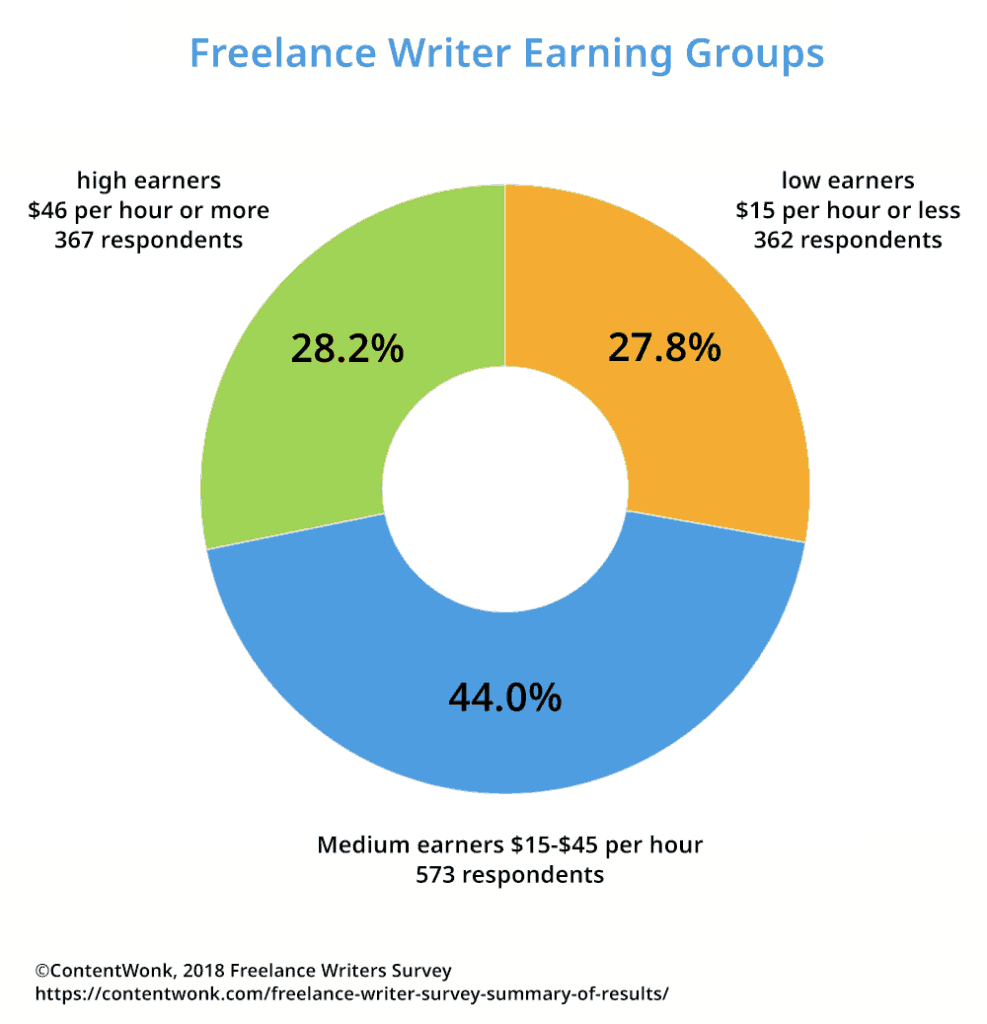
Key Insights
So what is the difference between the freelancers who are earning a living and the freelancers who aren’t? Five things stood out:
1. How much recurring work they have.
Low earners are seven times as likely to say they get “no recurring work” as high earners are.
2. How long they’ve been doing freelance writing.
High earners are six times more likely to have been writing professionally for 10 years or more than low earners are according to the freelance writers survey. And more than half – 54% – of high earners have been writing for more than 10 years. Unfortunately, only 4% of freelance writers make it into the high earners group in their first year.
3. What type of clients they have.
High earners are nearly six times more likely to work directly with larger companies than low earners. They’re also more than three times as likely to work with agencies.
4. How much time they spend doing paid writing every week.
Freelance writers who write less than 8 hours a week are more than twice as likely to be in the low earners group.
5. Where they get work.
Freelance writers get more work from their personal networks than anywhere else, but client referrals are a close second for high earners. High earners are more than three times as likely to get most of their work from referrals than low earners are.
About money
Freelance writers are notoriously underpaid. And while 28% of respondents of the freelance writers survey are earning $15 or less per hour, many others are doing much better.
Here’s the breakout of what percentage of freelancers earn what per hour:
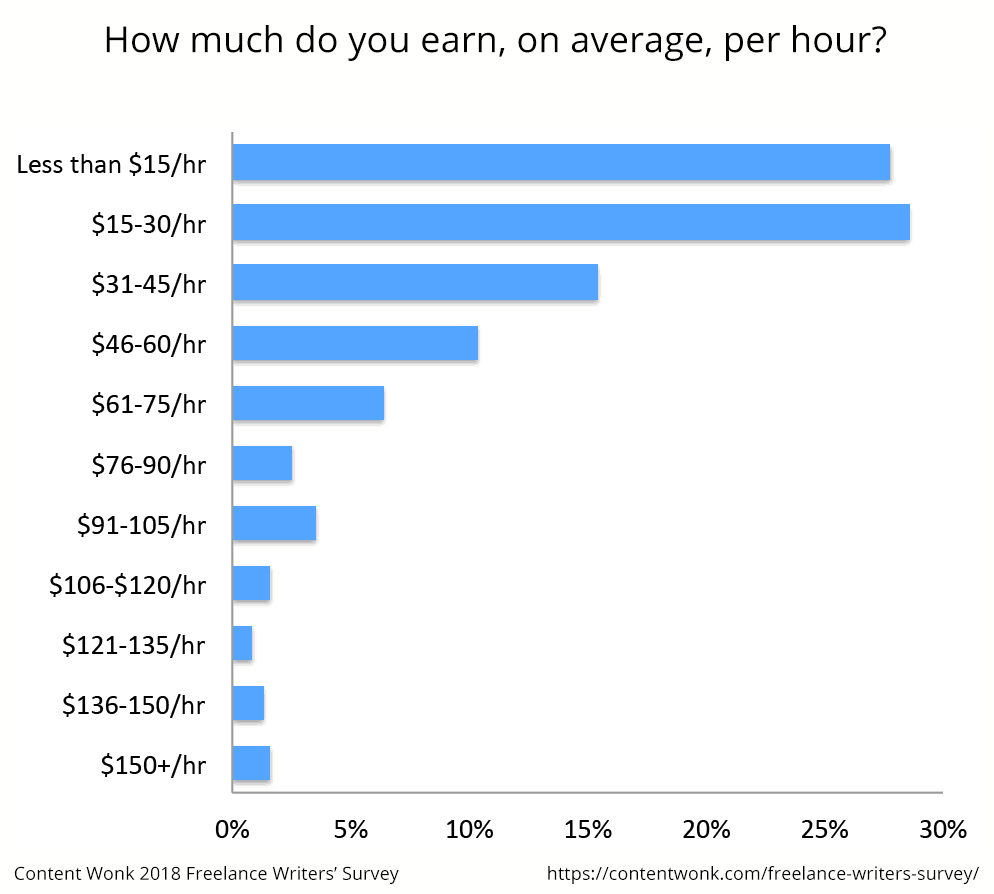
57% of freelance writers are earning $30 or less per hour. 11.4% are earning more than $75 per hour.
$75 per hour is a bright line for many writers’ coaches. It’s the minimum rate they believe someone can make and still have enough money to do things like buy a house, take vacations, and retire.
When you look at these hourly earnings through that lens, they’re a little depressing – only 11% of the respondents who took the freelance writers survey are earning a professional wage.
But if you compare these rates to what the average American earns per hour, freelancers are about average.
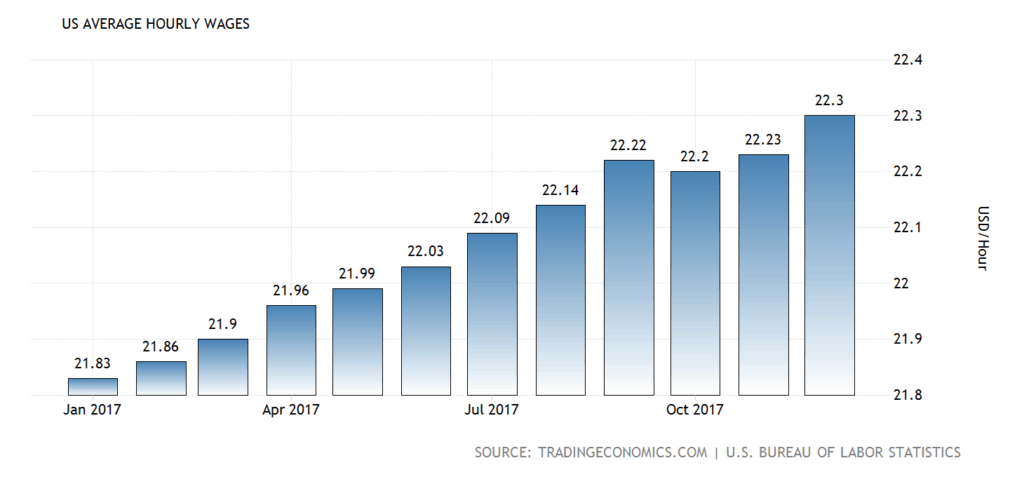
Annual income
Hourly wages aren’t the whole story, though. This is what freelancers earn for annual gross income.
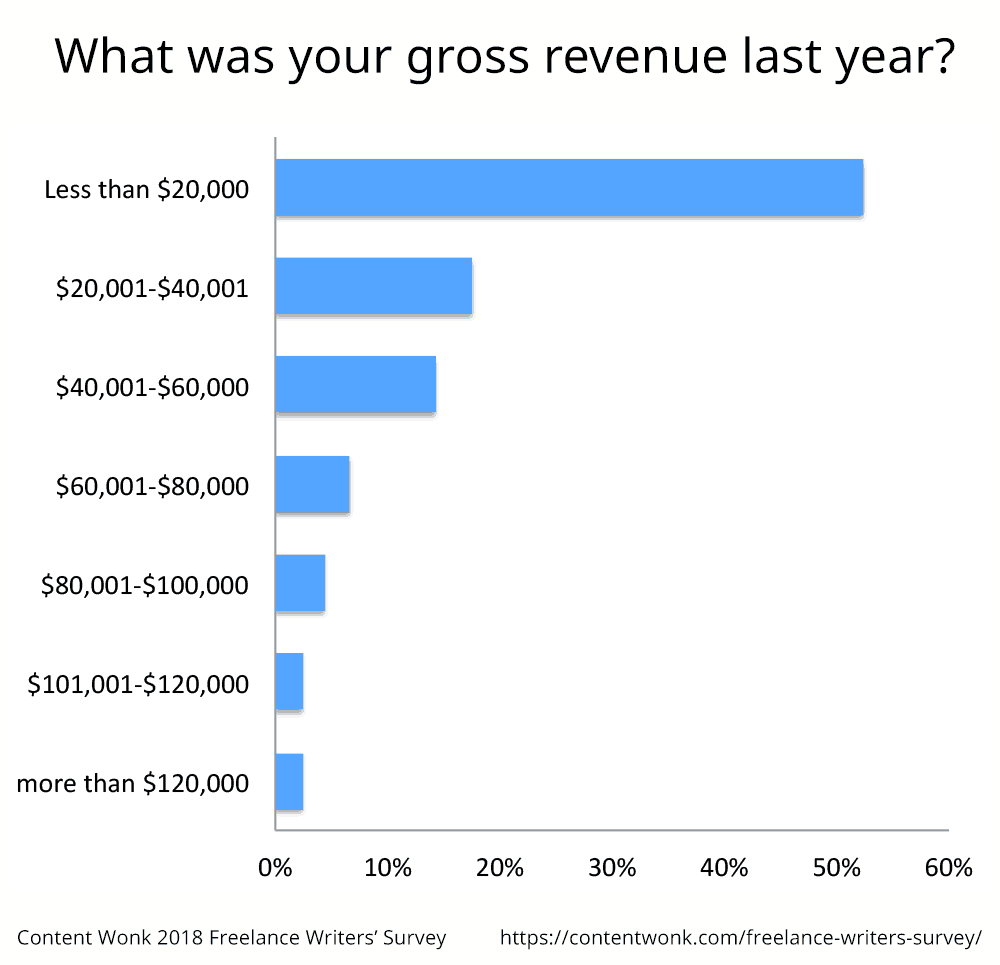
That doesn’t look very good at all, but do take into account that most freelancers aren’t full time. 51% write less than 14 hours a week.
That means that at least half of all freelance writers do it part-time.
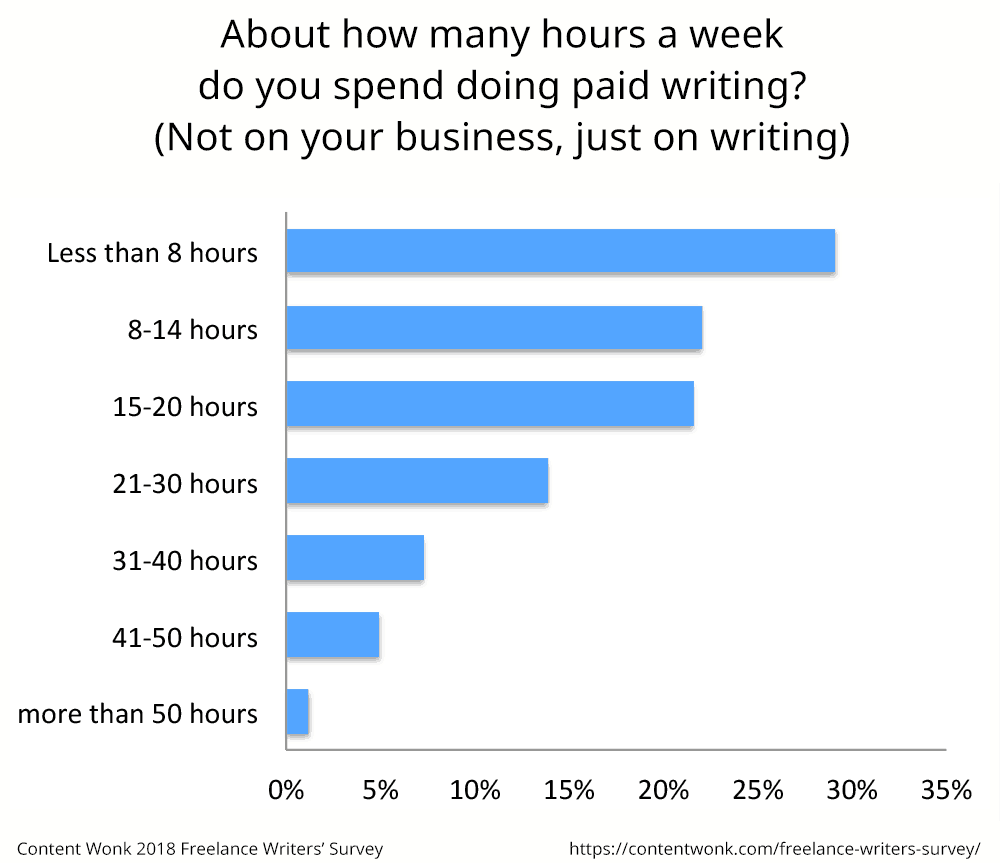
This complements another finding in the freelance writers survey, from a question about what freelancers would like to change about their business. Many writers said they wanted to do more freelancing, and hope to even go full-time.
They’re smart to want that: It appears that the more hours you write per week, the higher your hourly earnings are.
Writers in the low earners group ($15 per hour or less) were three times more likely to say they write less than eight hours a week.
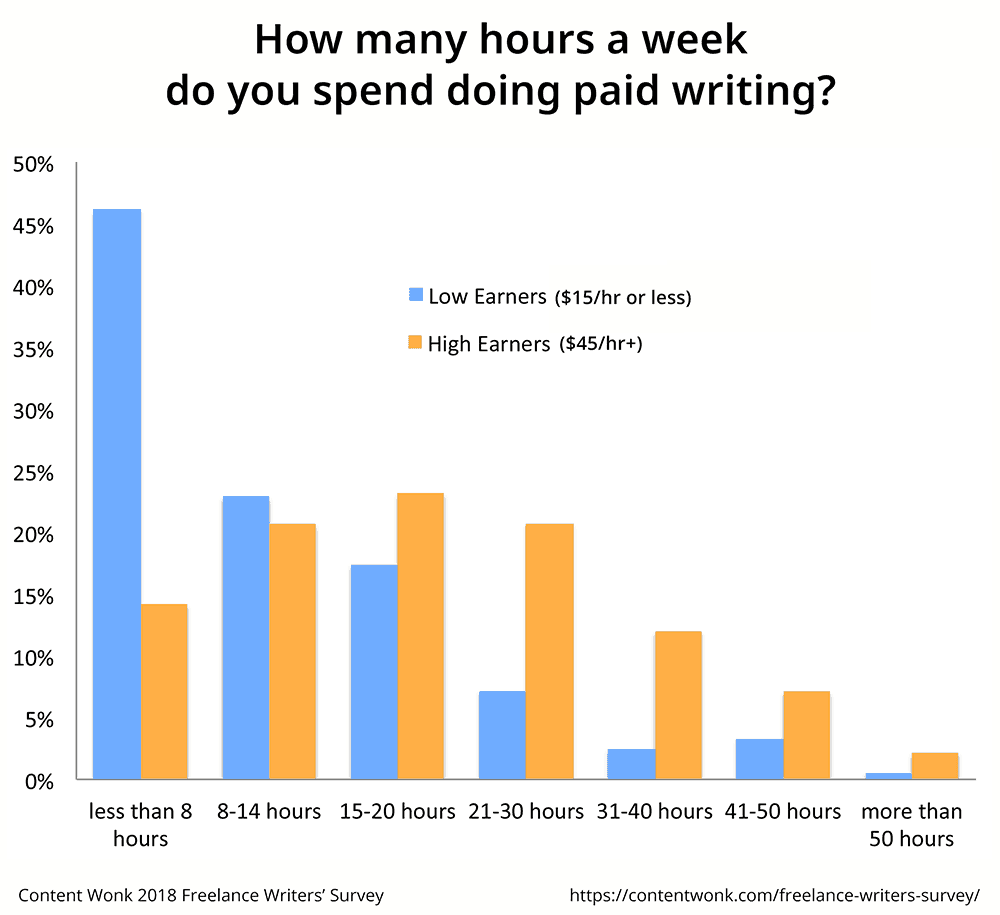
How they decide what to charge
The answers to this question were varied, but there is one clear difference between how high earners and low earners answered this question.
Low earners are almost three times as likely to charge by the word. 14% of them do this, versus only 4% of high earners.
Here’s how the general population of freelancers answered this question:
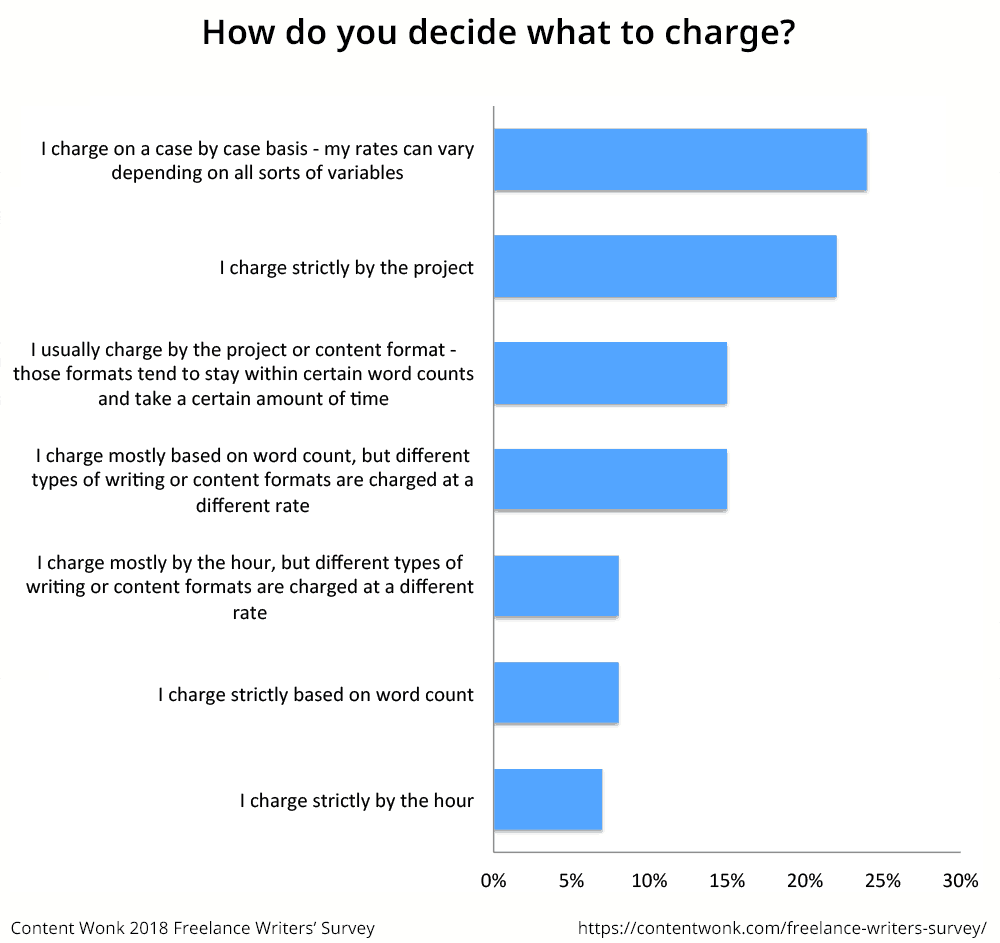
How quickly they get paid
This was another question that got varied answers in the freelance writers survey, but unfortunately the most common length of time between invoice and cash in hand is two weeks to a month.
Freelancers who earn less tend to get paid a little faster. This may be because they work for content mills more often, and many mills pay weekly.
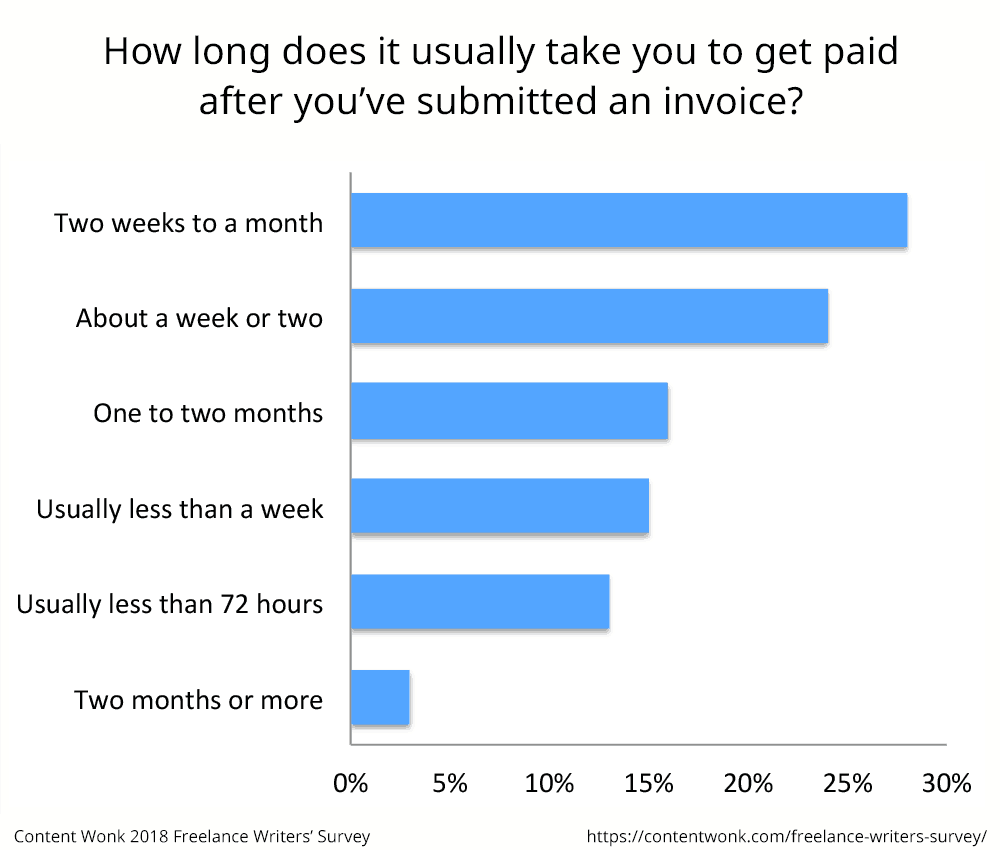
How often they don’t get paid
This is never a fun topic, but if it’s happened to you, know that you’re not alone.
40% of the freelancers surveyed reported that they had been stiffed by a client at least once.
And for some of them, it was more than just once. 11% said they have not been paid by clients three times or more.
Freelancers’ experience and specialization
There’s a common wisdom among freelancers: It takes a few years to figure this thing out.
That is starkly supported by this research. Over half of the freelancers who have been writing for over a decade qualify as high-earners.
Compare that to the freelancers who have been writing professionally for only a year: Only 4% of them earn more than $45 an hour.
How long you’ve been a freelance writer ends up being one of the most powerful determinants of how much you earn.
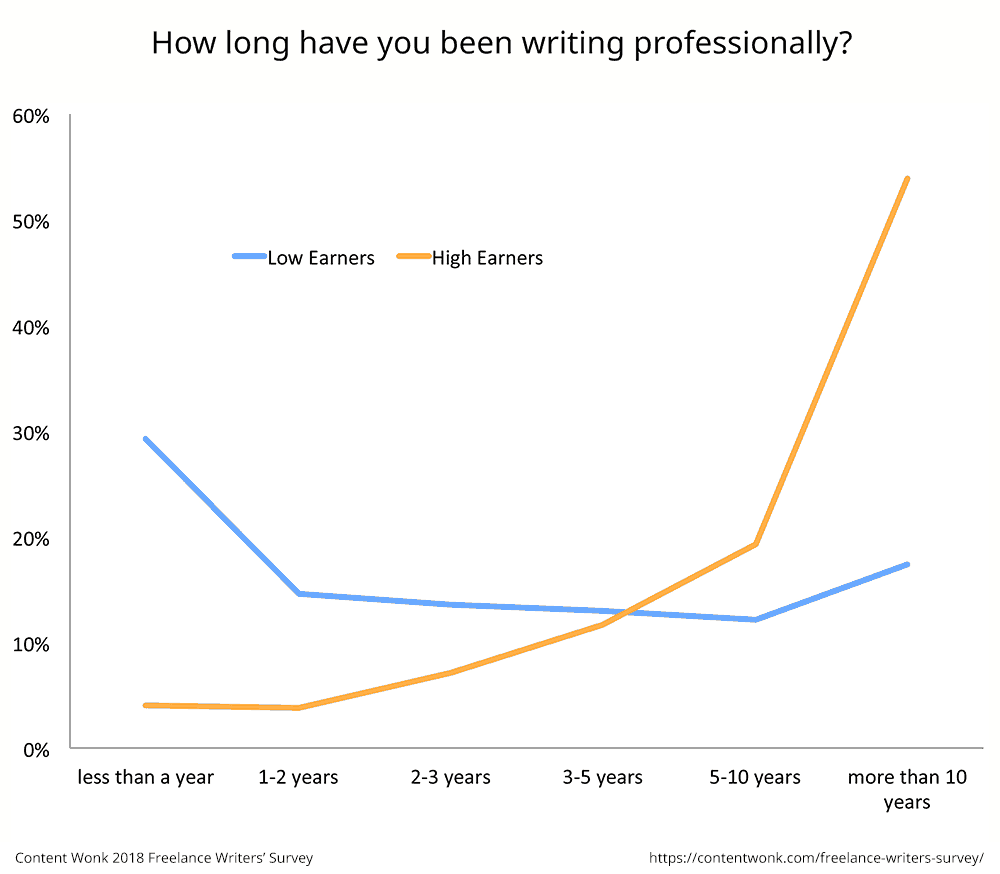
The good news is that if you can hang in there for five years, your chances of earning a living wage jump dramatically.
This “experience pays” phenomena might explain why so many of the freelancers surveyed have been doing it so long.
Half of the freelancers who completed the freelance writers survey have been writing for five years or more.
This may be because we made an extra effort to get successful freelance writers to complete the survey. Or it may be that people don’t identify themselves publicly as freelance writers until they’ve been doing it for a few years. Many mill writers don’t have a business platform.
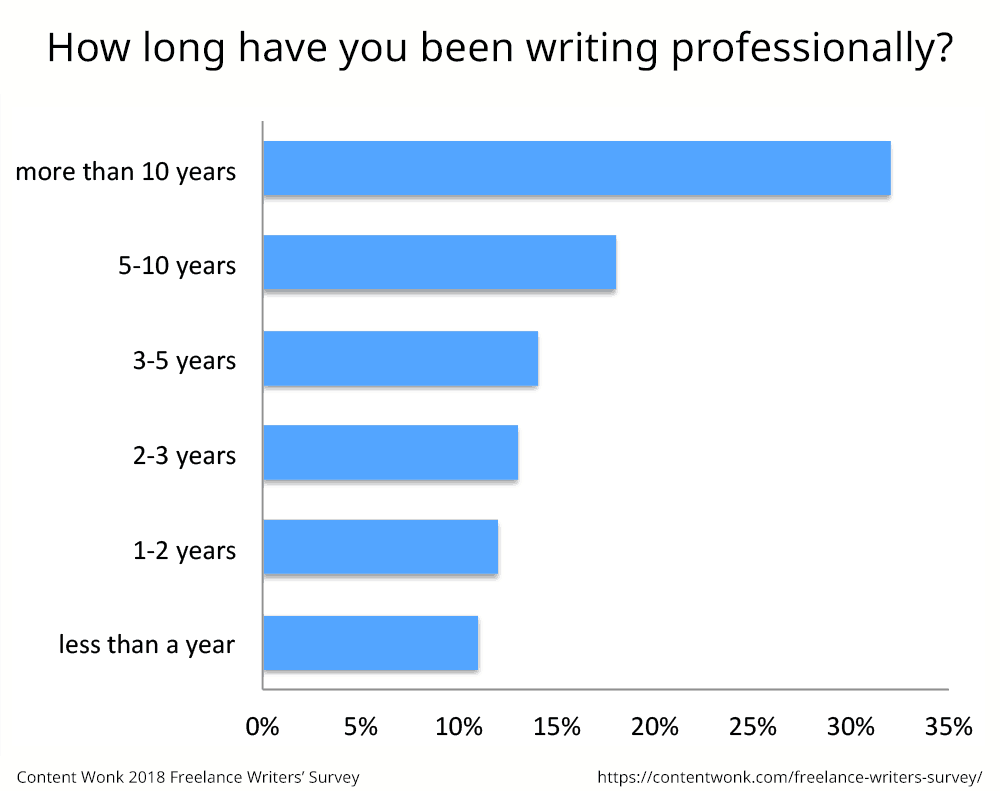
Do you specialize in or write about any particular subject topics, or are you a generalist?
You may have heard of the term “subject expert” or “influencer” if you spend any time in digital marketing circles. The terms are fairly self-explanatory, though “influencers” tend to have larger social media audiences.
Many content marketing professionals have said that subject experts and influencers can command higher fees than “mere” freelance writers. It’s also been assumed that writers can be more authoritative and efficient with their time in they specialize in a particular subject area.
But the data on earnings doesn’t bear that out.
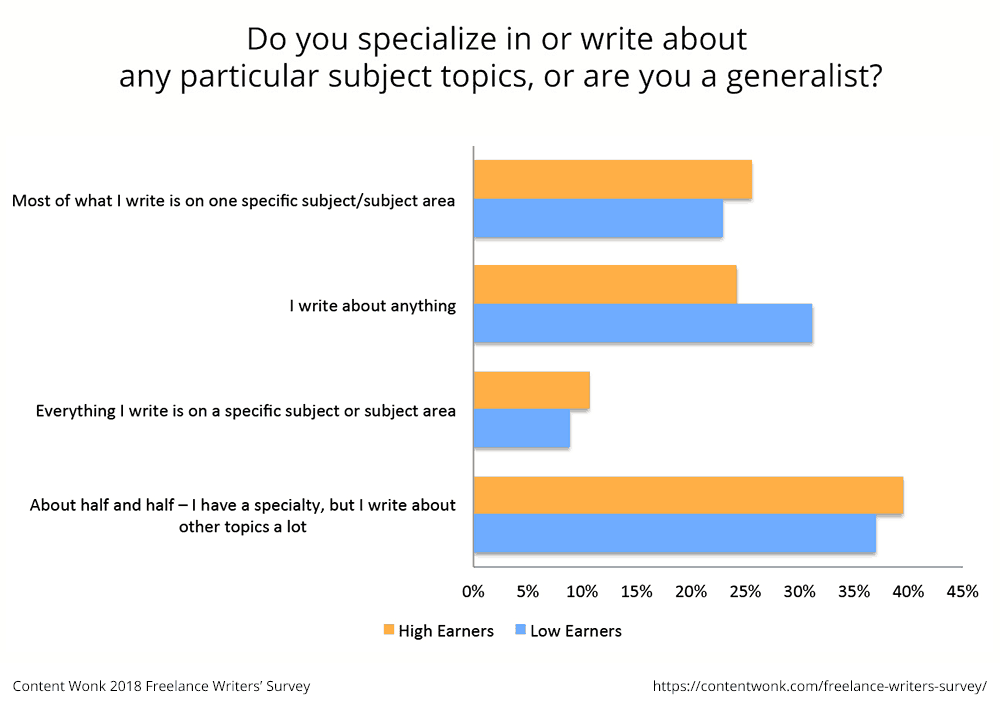
Here’s how the general population of writers characterizes how much they specialize:

Incredibly, there’s no statistically valid difference between high and low earners when it comes to specialization. Though it is interesting to see how low earners are somewhat more likely to say they write about anything.
Still, despite the common perception, specializing in a particular subject area alone does not appear to be enough to raise your income.
What types of writing or content formats do freelance writers do the most?
Here’s how the entire group of 1,300 writers answered this question. They were allowed to choose more than one format.
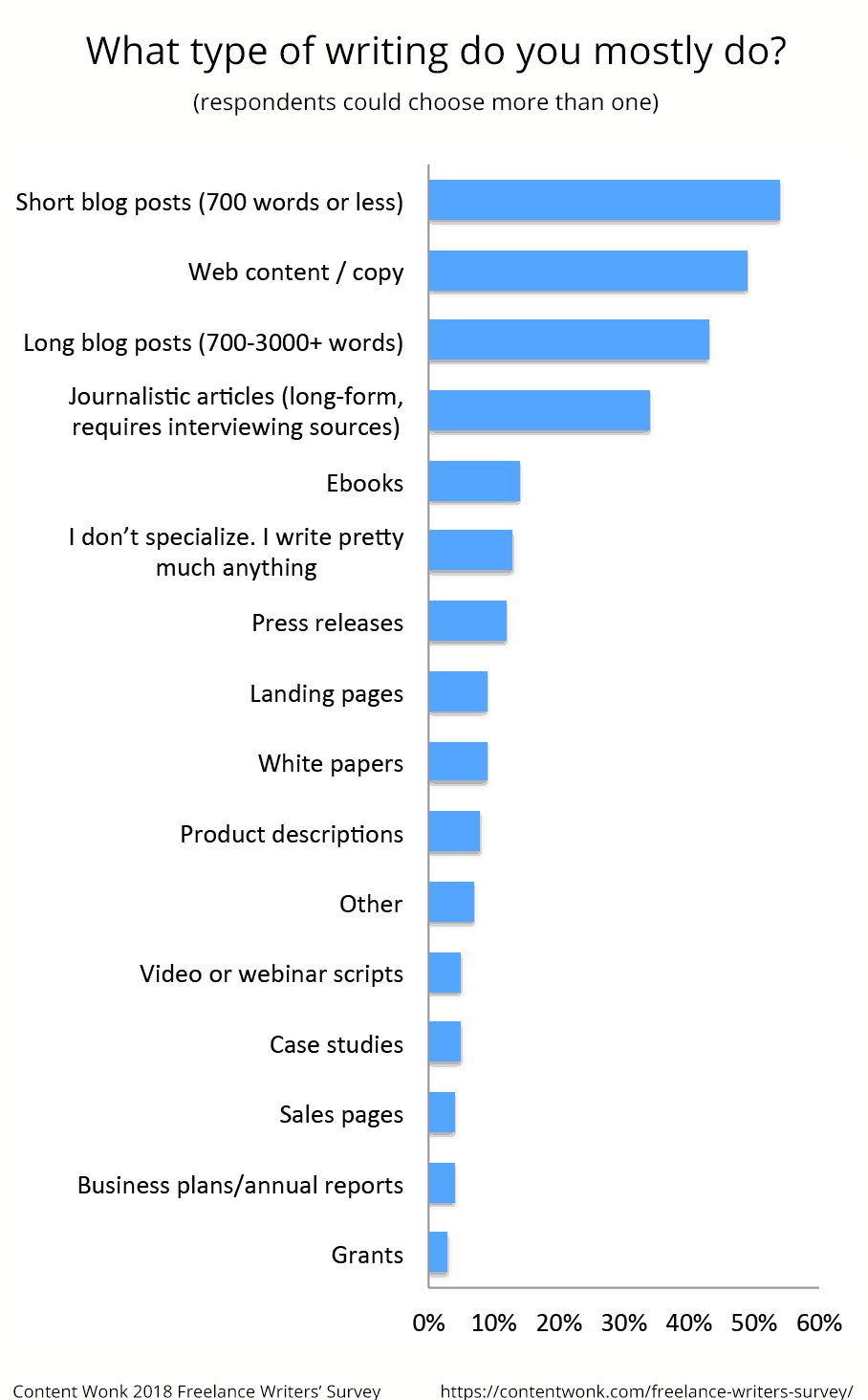
The results here aren’t surprising, but they do highlight how blog posts and other web content make up the bulk of most freelance writers’ work.
But what’s interesting is how the high and low earning freelancers answered this.
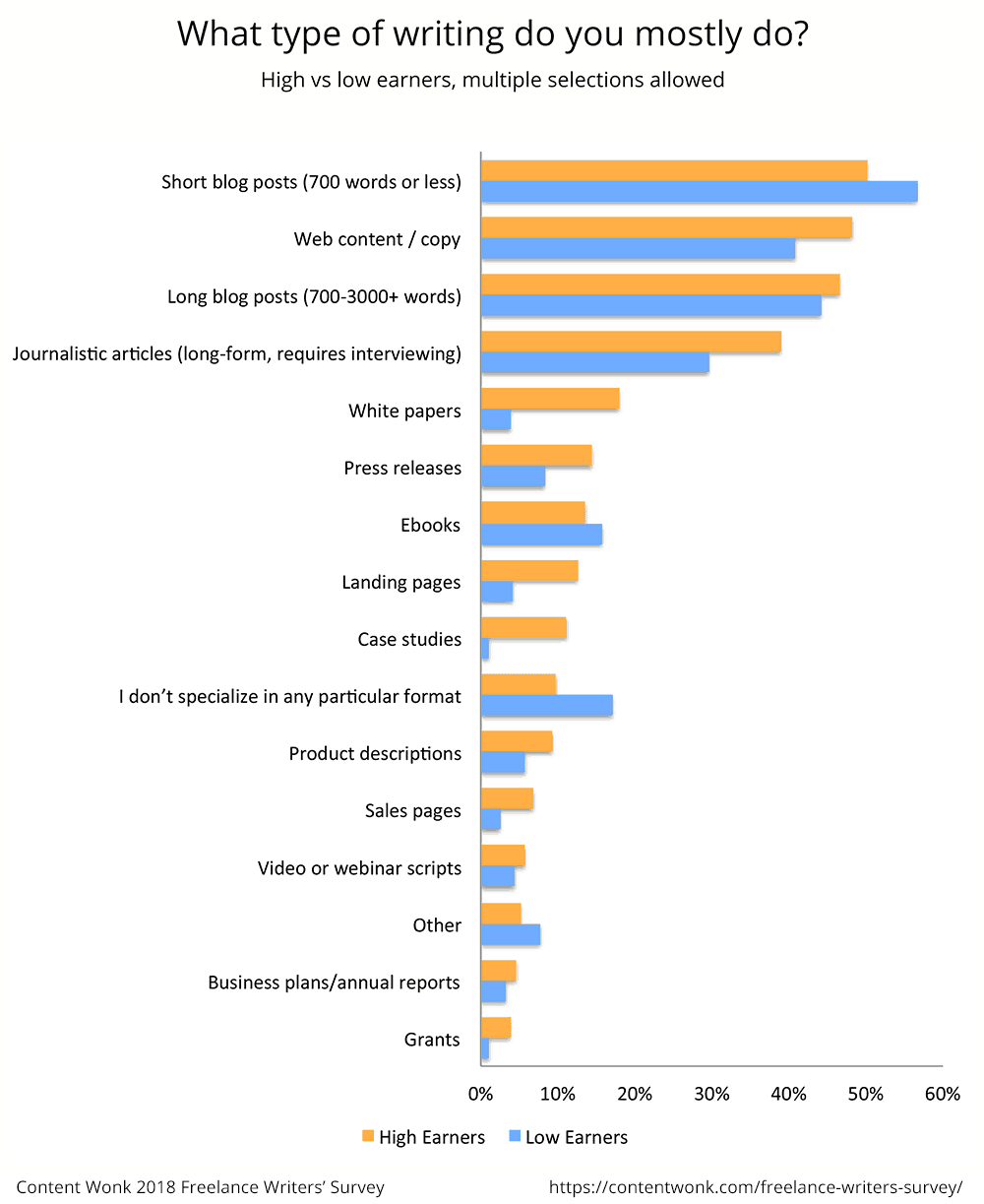
High earners are more likely to write white papers, case studies and landing pages. But there are also portion of low earners doing each of those formats. This strongly suggests that some low earners need to ask for a raise.
How freelancers manage their businesses
There’s more to being a freelance writer than just writing. If you neglect the business side of your business, you can find yourself with no work… or even out of business.
But it seems that some freelance writers have figured out a way to earn a good living without being overwhelmed by business chores. In fact, about 60% of freelancers spend less than four hours a week managing and promoting their business.
This was one of the biggest surprises of the survey: How much time you spend managing your business has almost no effect on how much you earn.
High earners and low earners spend – or don’t spend – the same amount of time on their businesses.
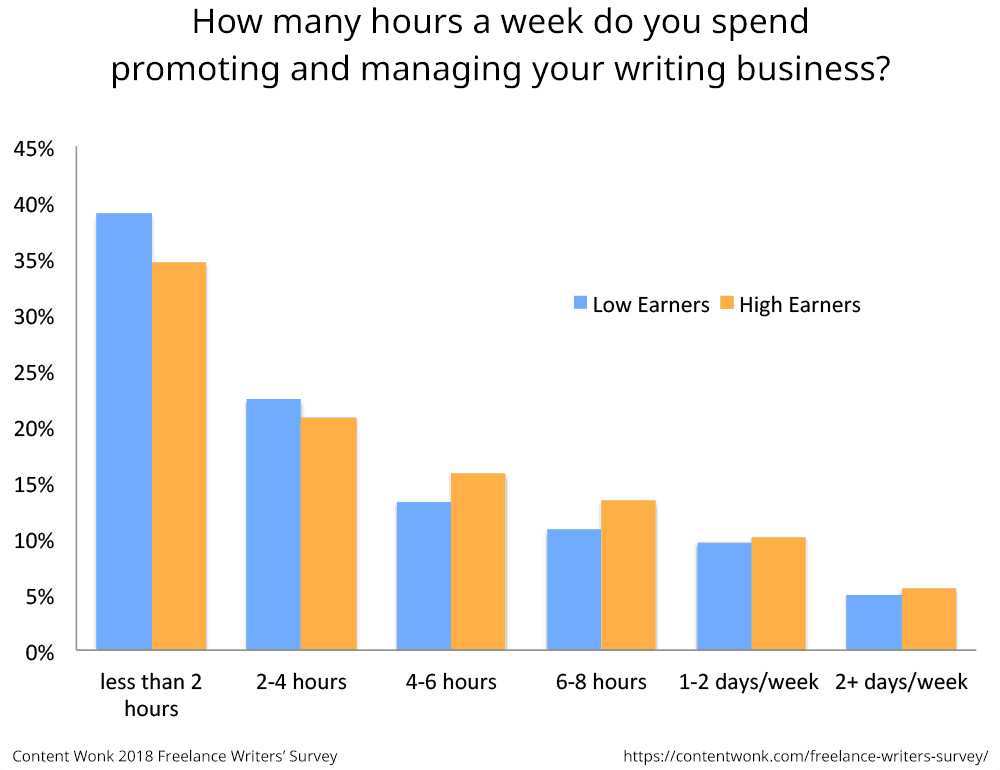
Here’s how the general population of 1,300 freelancers (at all earning levels) allocates their time to managing and promoting their business:
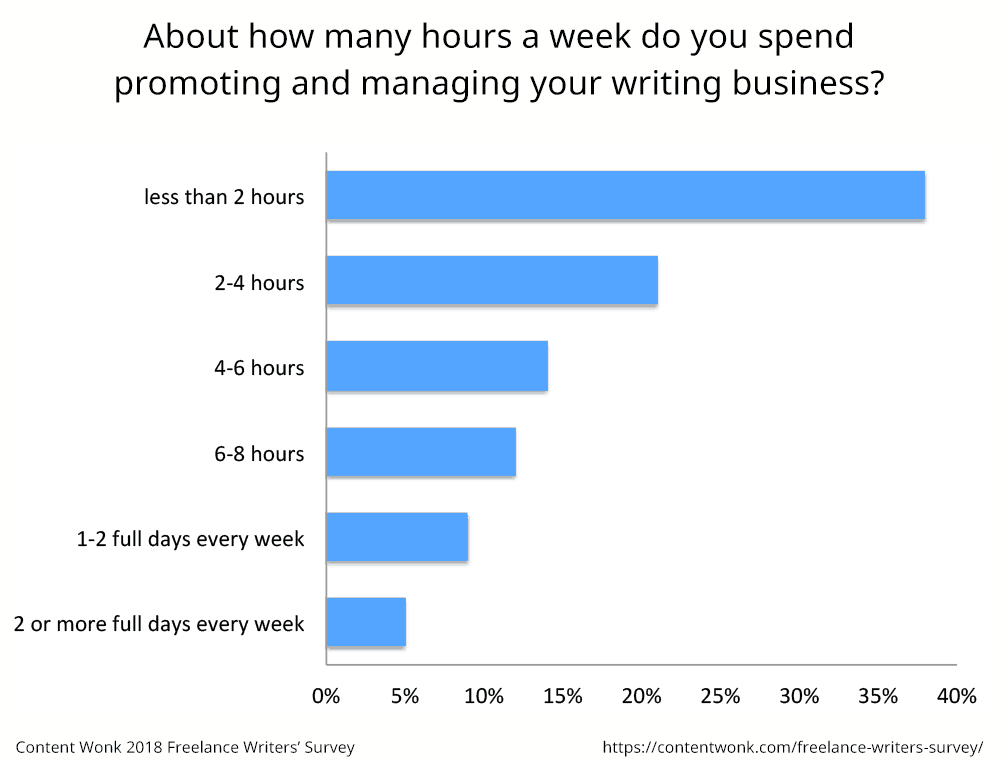
How do they get most of their work?
Finding work is one of the biggest challenges freelance writers face. Even when there is enough work, there’s usually a desire to get better work.
Here’s where the freelancers say the work actually comes from:
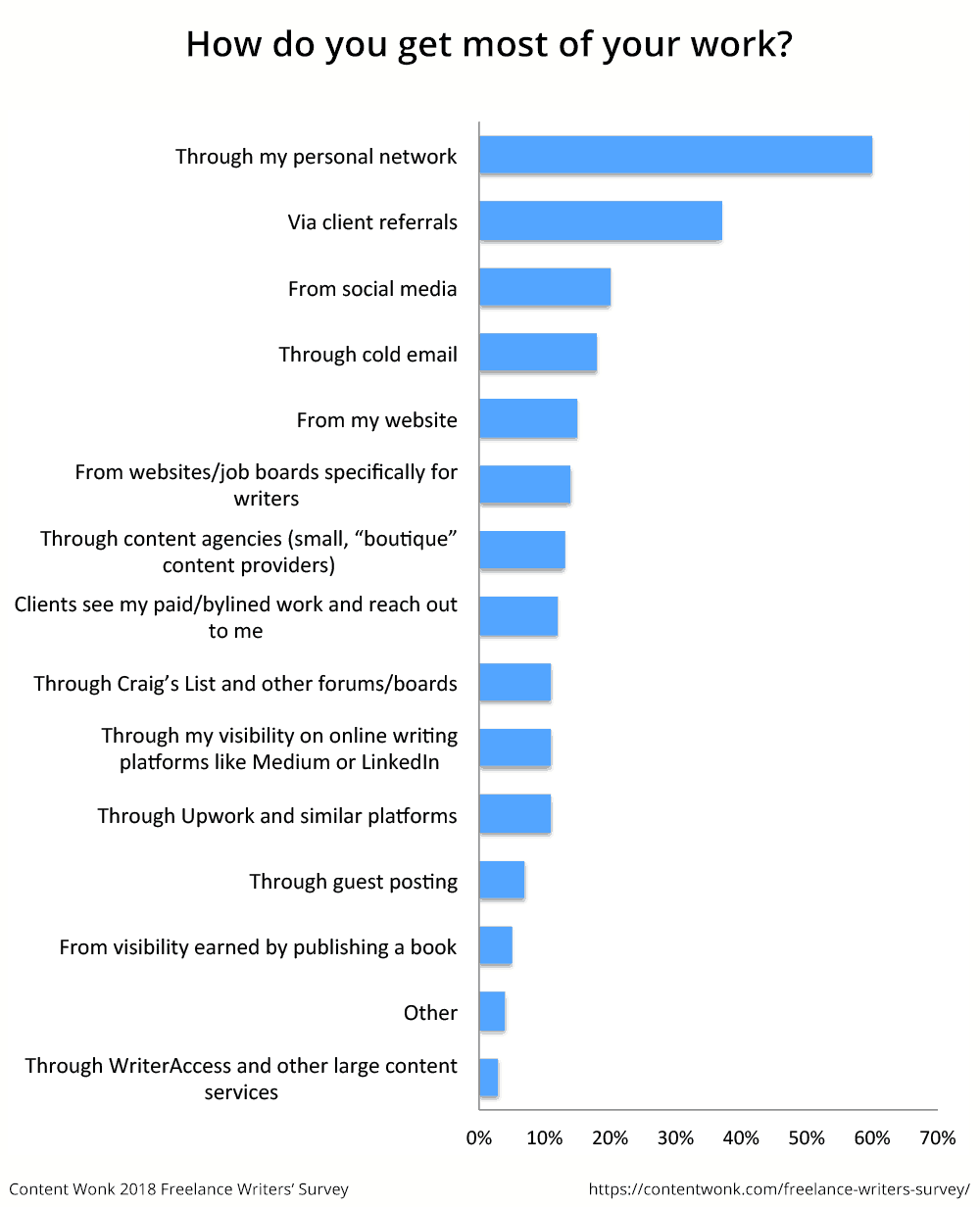
There are several striking things about these answers.
First, how can it be that only 20% of freelance writers say they get work from their website – when 70% of freelancers have a website? That means that more than half of the writers with websites aren’t getting any business from them.
Second, witness the power of having a good personal network. No other tactic generates as much work.
And third: Client referrals work. High earners get dramatically more client referrals than their peers.
High earners are also more likely to attract clients through bylined work, whether it appears on a clients site or on a platform like Medium or LinkedIn.
Finally, notice where high-earners are not getting work. Guest posting – long considered a proven way to gain visibility and attract clients – is used by barely one in twenty high-earning freelancers. They are also less likely to find clients on social media.
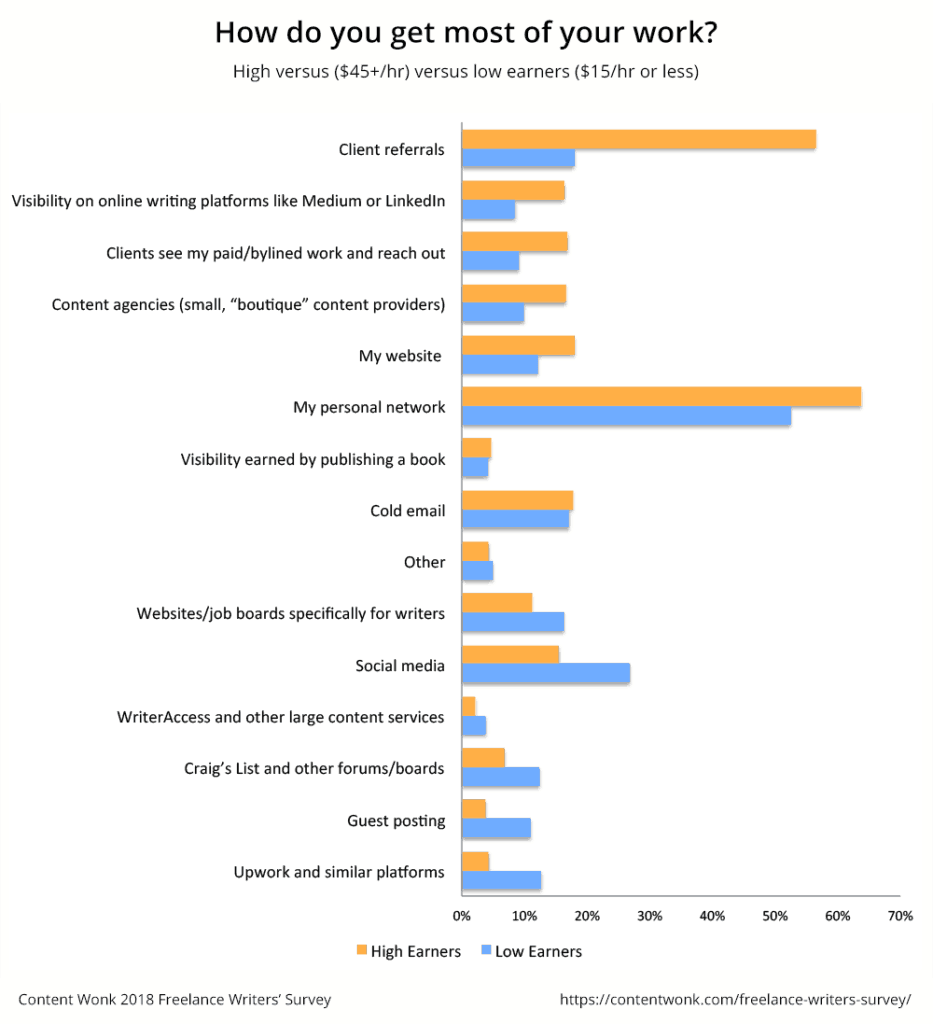
Recurring Work
If you only take one thing from this study, take this: Get yourself more recurring work.
There is no stronger determinate of how much a freelancer earns than how much recurring work they have. Low earners are nearly seven times as likely to say they have “no recurring work” than high earners are.
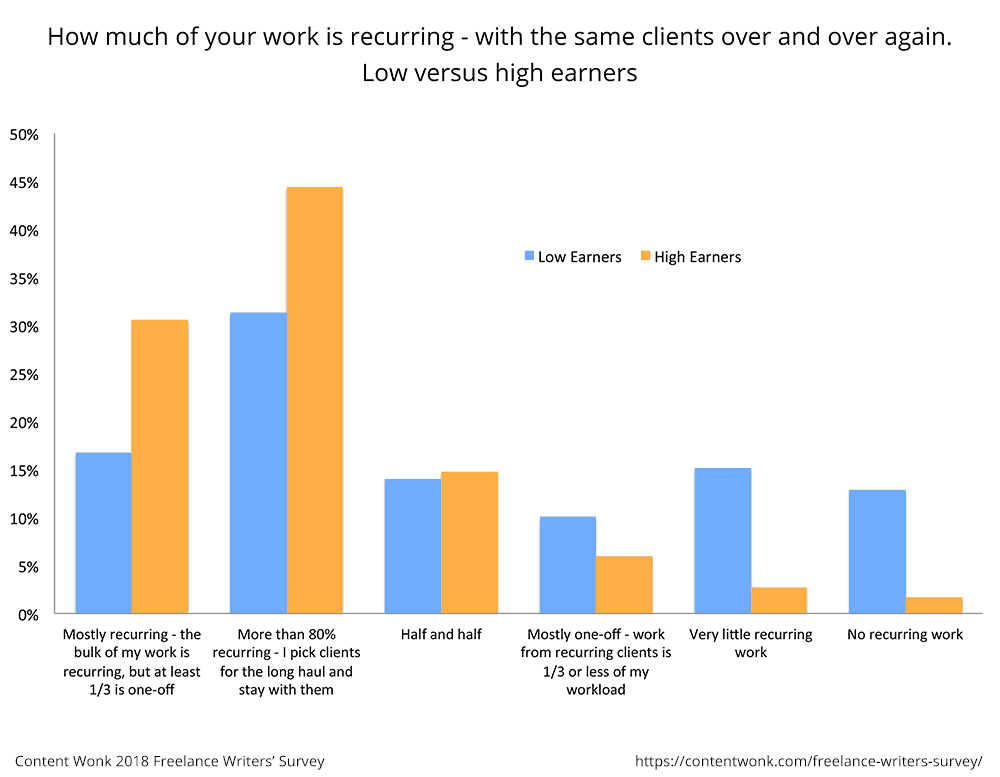
This difference becomes even more extreme the more the freelancer earns. Among the ultra-high earners making $75 or more an hour, 76% of them say that “most” or “more than 80%” of their work is recurring.
The money is in recurring work.
So what about typical freelancers? They get a fair amount of recurring work, too. This is how much recurring work the general population of freelancers says they get:
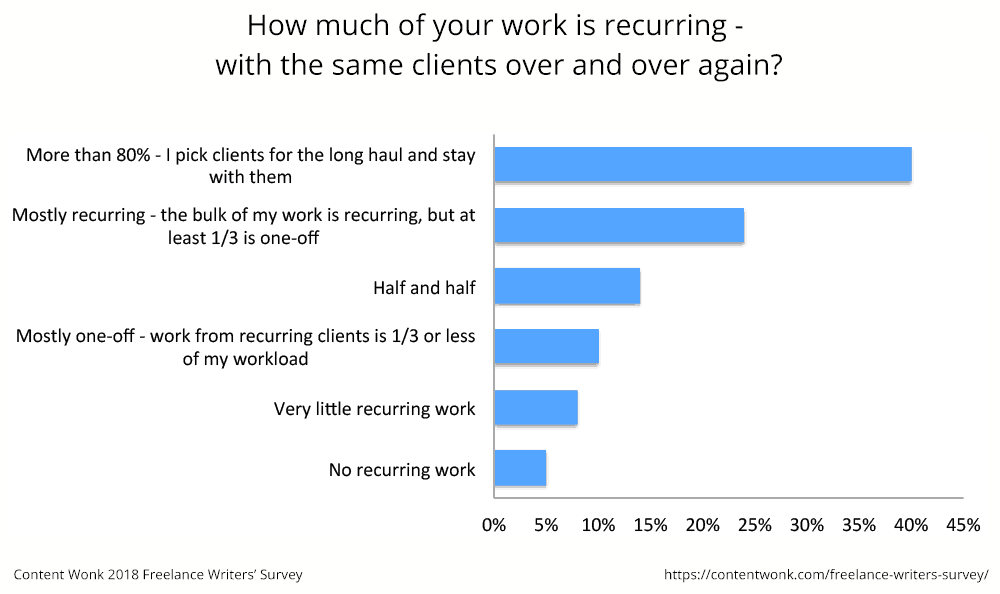
How many freelancers have their own website?
Most freelance writer coaches will tell you this is a must-have: “Every serious writer has their own website.” And while that might be true, having or not having a website does not appear to make a significant difference in what you actually earn.
And it’s not like most freelancers don’t have websites, either. Among the entire 1,308 freelancers who completed the survey, 70% had their own website.
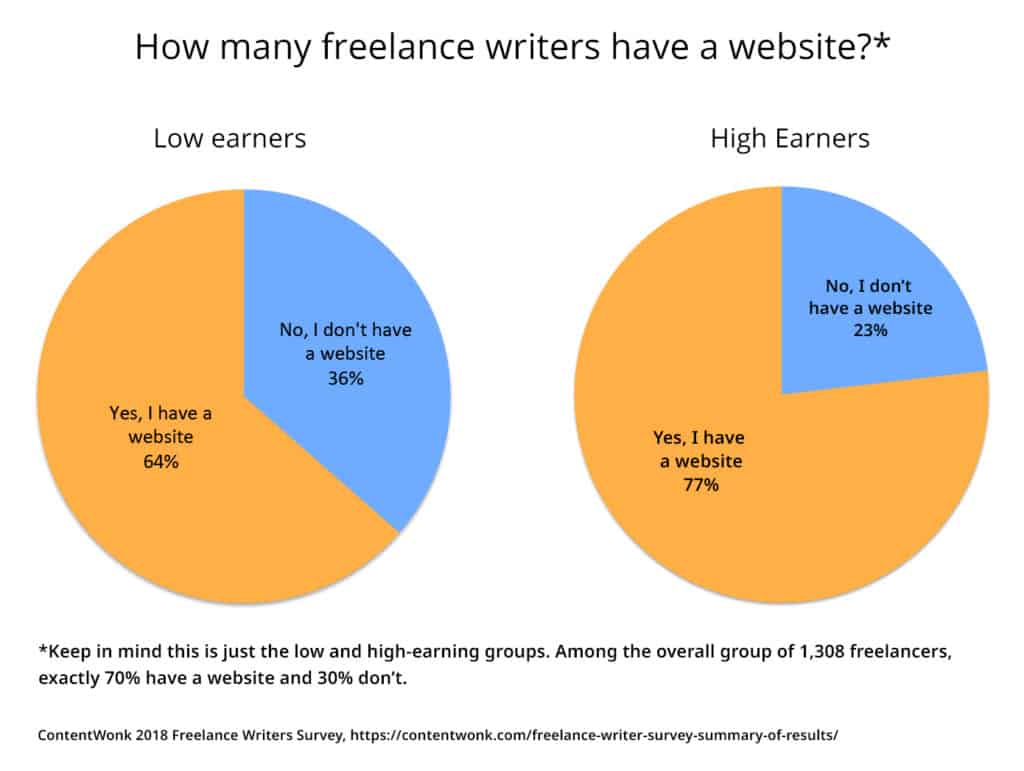
They’re even taking care of these websites: Among the freelancers who do have a website, 40% update their site at least several times a month.
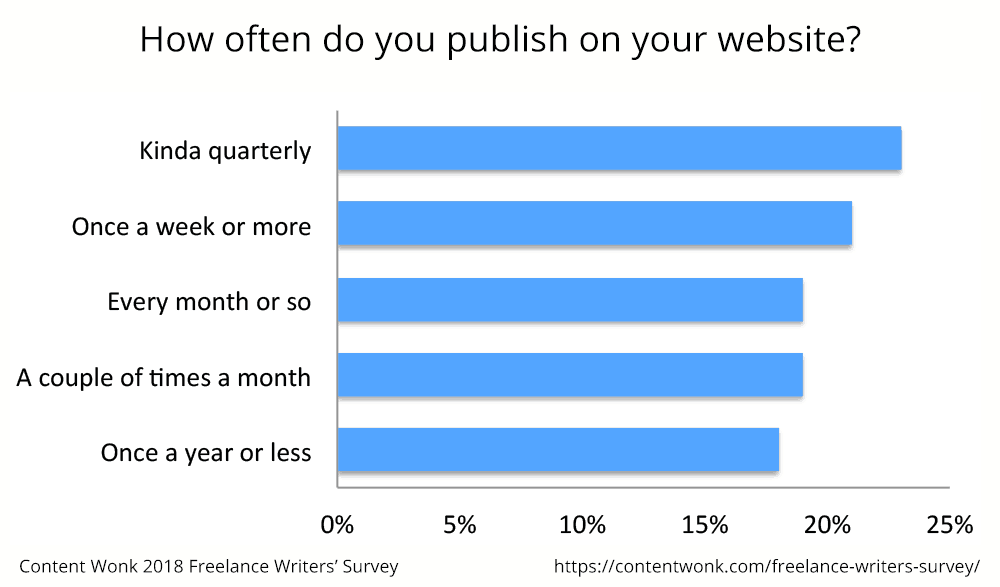
How many freelance writers have an email list?
After having a website and a blog, the next most common recommendation for freelancers is to build an email list. And some do: 31% of the freelancer writers surveyed have a list.
While the lists tend to be small (67% of them are 500 subscribers or less), freelancers still manage to get their newsletters out. 53% of them say they mail to their lists at least once a month.
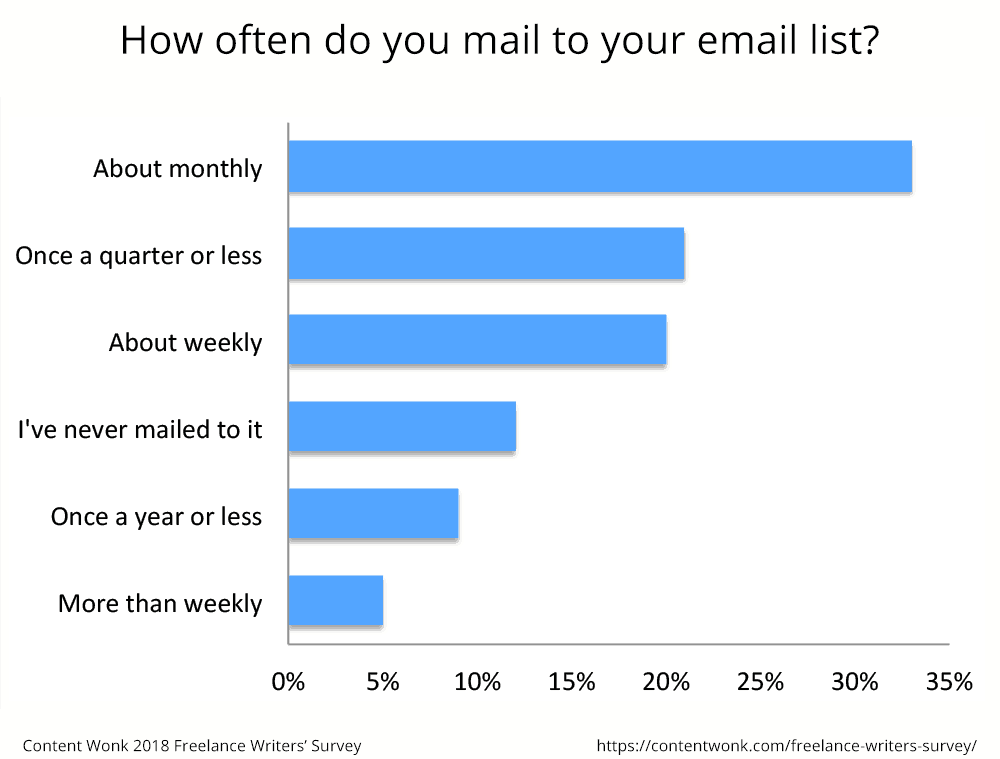
How large a social media presence do freelance writers have?
It’s a common practice for freelance writers to try to build a social media following. This is complementary to other common business assets like having a website or an email list. As we saw in an earlier chart, social media is also a decent channel for finding work. And it’s a way to promote the work you’ve done for existing clients.
So how large is the typical freelance writer’s social media audience? Fairly small: 86% of freelance writers have under 5,000 social media followers across all platforms.

High earners do tend to have larger social media audiences, particularly in the range of 5,000 to 10,000 followers.
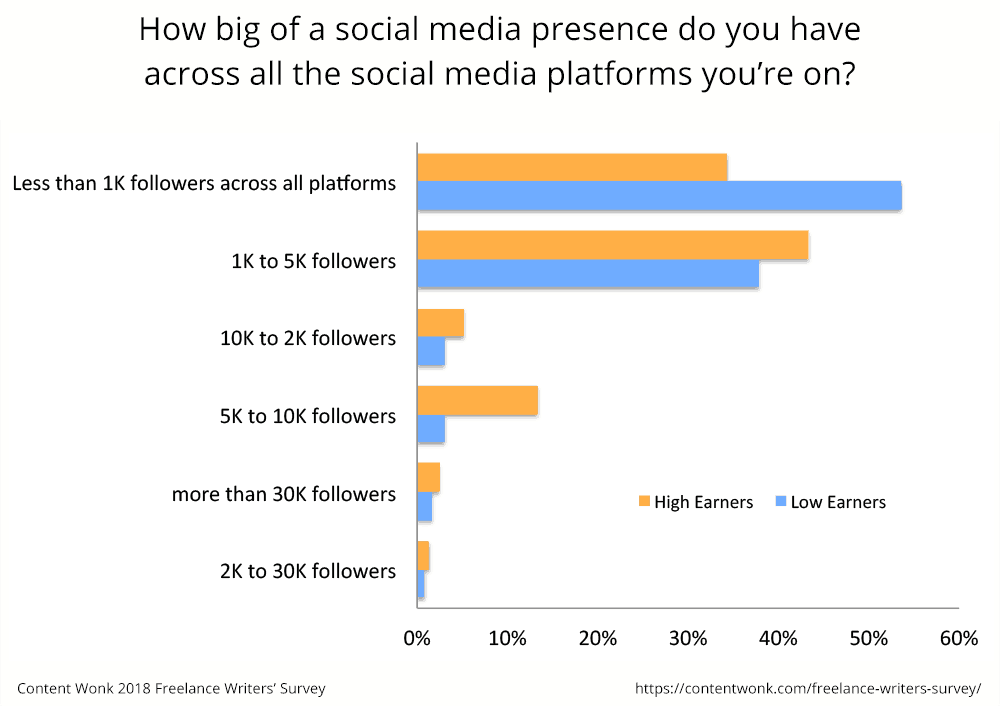
These writers with larger audiences could qualify as “influencers” or “micro-influencers” – especially if they have active sites and a truly engaged audience. And the influencer business model is complementary to what many freelancers do.
We’ll see in a moment that writing a book doesn’t seem to help much with income, but perhaps some freelance writers could open up a second stream of income by partnering with companies as paid influencers.
How many freelance writers have written a book?
Short answer: not many. Of the general population of freelancers, 27% said they had written a book – including Kindle books.
This was a bit of a surprise. I had expected more freelancers to have tried this format, particularly because writing a book seems like such an ideal way to build a platform.
But even freelancers who make over $45 an hour aren’t likely to have written a full-length book. And they’re only a hair more likely to have published a book than freelancers who earn less than $15 per hour. The difference isn’t even statistically valid.
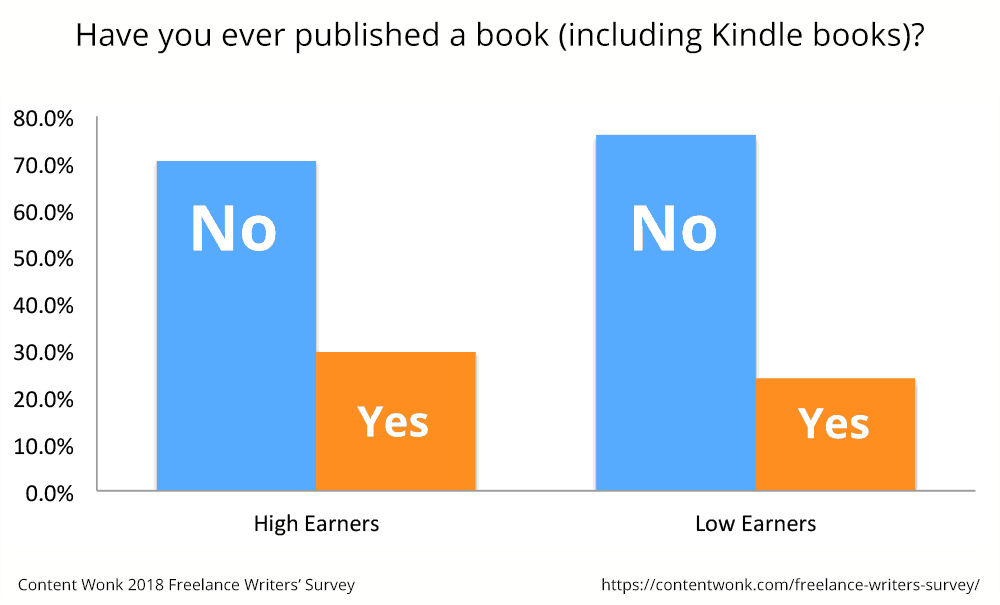
What was even more surprising is that among the freelancers who have written a book, half of them (exactly 50%) said it got them “no clients” or “not many clients”. Only 12% – 44 people – said writing a book had gotten them “lots of clients”.
Even 45% of the high-earners said writing a book (or books) got them “no clients” or “not many clients”.
About Clients
Good clients can make a freelancer’s life a breeze. But bad clients… are best left as soon as possible.
Because clients are so important to freelancers’ work, the survey had several questions about them.
Let’s start with what kinds of clients freelance writers said they tended to work with most. Here’s what the general population of freelancers said:
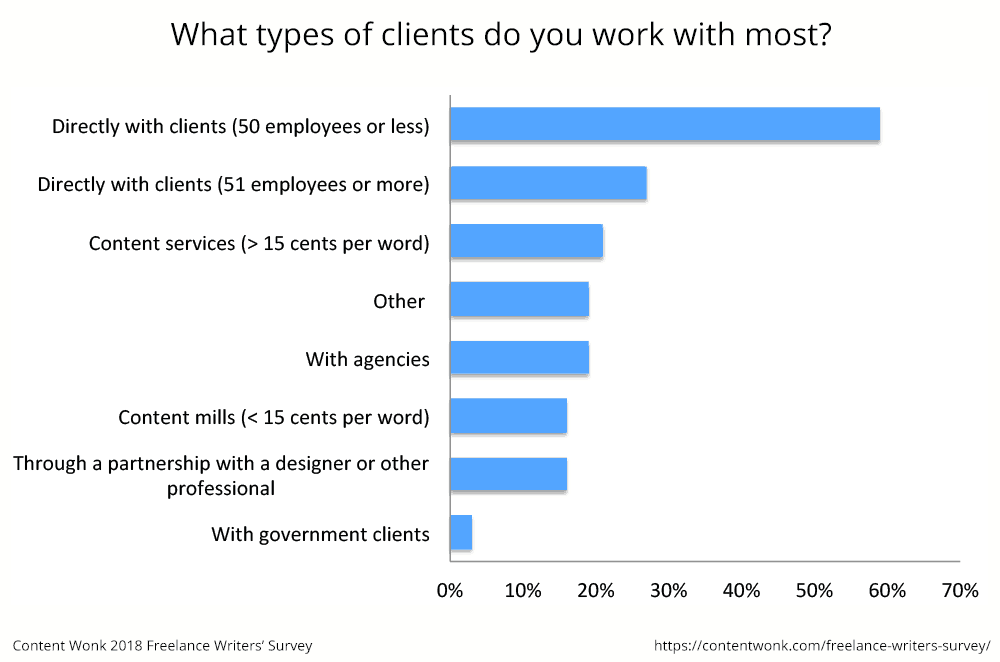
There was a significant difference between the types of clients that high earners and low earners tend to get. High earners gravitate more towards working directly with companies (especially companies with 51 employees or more) and ad agencies.
Low earners, not too surprisingly, tend to work with content mills more often.
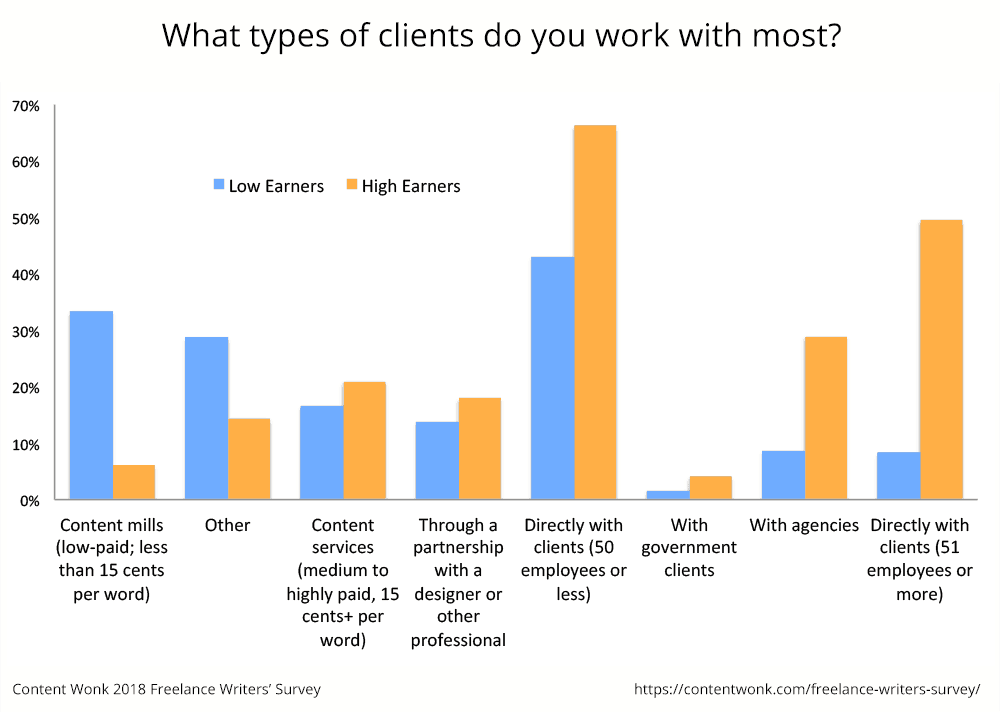
This is one way to categorize clients, but there’s another way some of you may be more familiar with: B2B (business to business) versus (B2C) business to consumer.
How do B2B or B2C freelance writers compare?
More freelancers lean toward B2C (Business to Consumer) than B2B (Business to Business). But it’s not a heavy tilt: 20% of freelancers work with “mostly” or “all” B2B companies. That’s less than the 53% who work “mostly” or “all” with B2Cers, but it’s still a sizable portion.
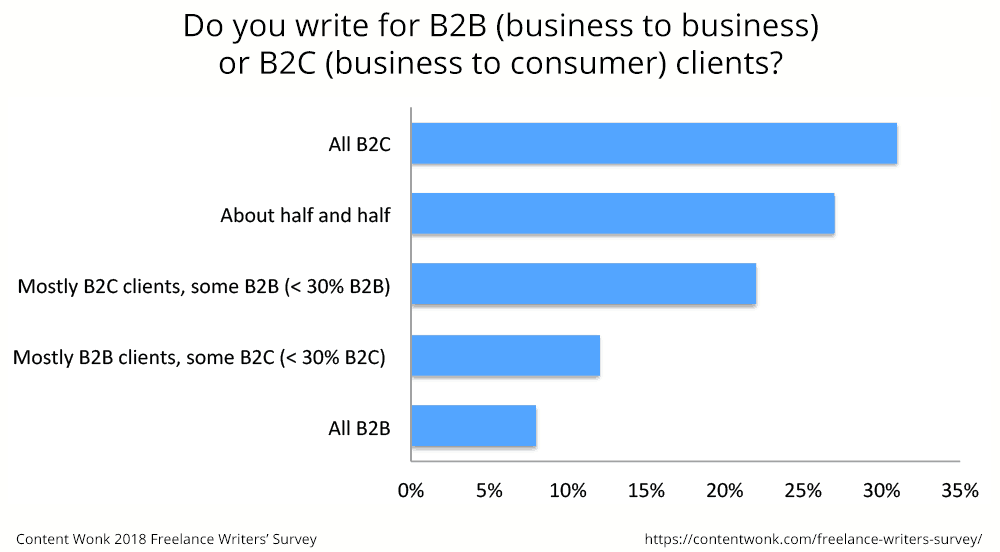
So which is better if you want to earn more? No contest: B2B.
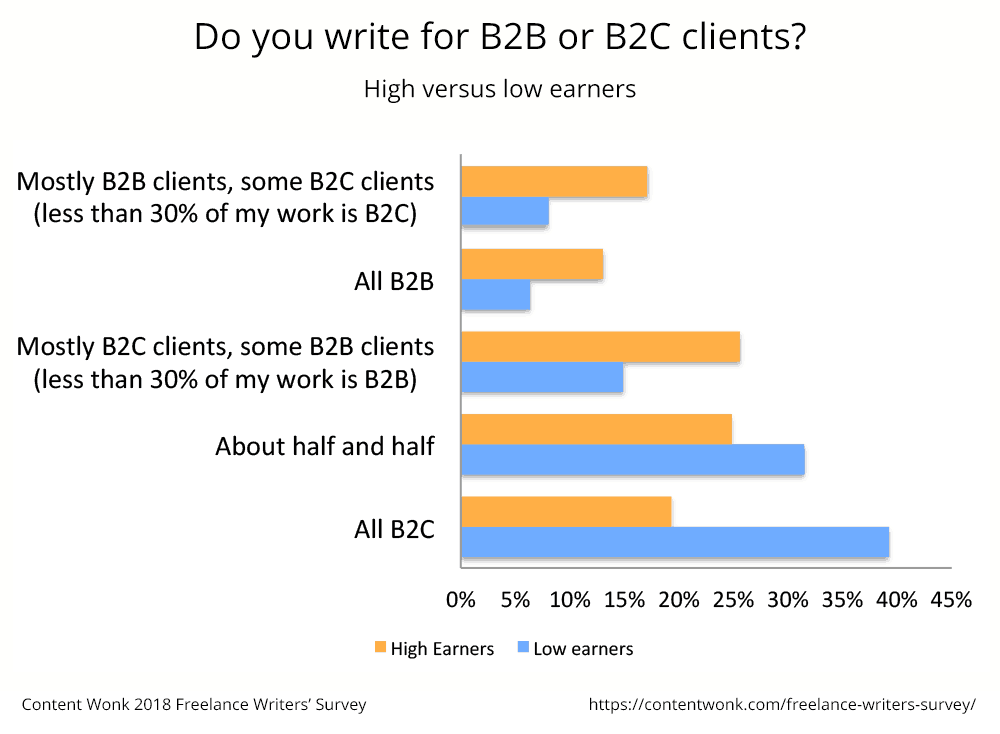
Do your clients tell you if your writing was successful?
If you’re a content creator, you’ve probably heard at least a little bit about how companies and publications are always worrying if their content is successful. And you’ve probably realized that your employment depends on whether your content “does well” or not.
And yet, most freelancers I know say they get very little feedback about how well their content performs. So I wanted to ask if other writers are seeing the same thing.
Ends up, they are:
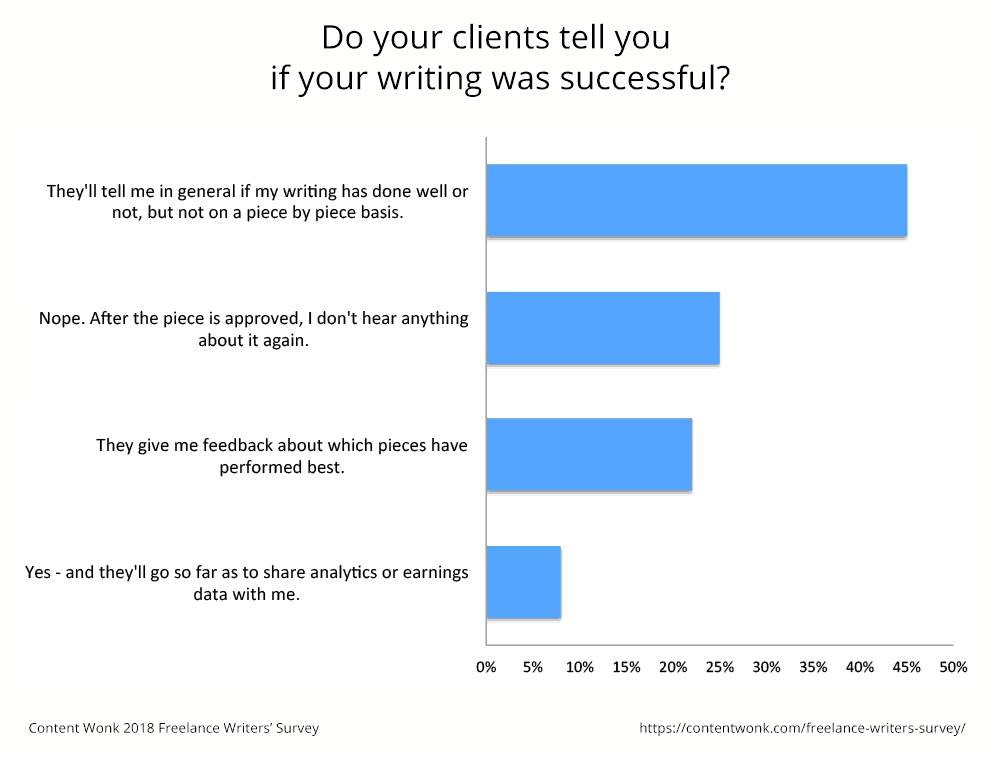
Low earners get a particularly bad deal on feedback. They are twice as likely to say that after a piece is approved, they never hear about it again.
What’s the one thing you wish your clients knew before they worked with you?
The #1 thing freelancers wish their clients knew before they started working together? What they want. This came up again and again, and in the same language.
Clients who don’t know what they want are hard to work with. They require more revisions than would otherwise be necessary (and often require complete rewrites). Some freelancers feel like their clients positively expect them to be mind readers.
The next most common thing freelancers want their clients to know is how much time it takes to produce good content. This is directly related to the biggest theme that came up: Freelancers wish their clients understood how much time, work, expertise and research it takes to deliver the final product. This strongly suggests that freelancers feel their work is not valued enough.
And sure enough: The 4th most common thing freelancers wished their clients knew was their value. Freelance writers believe in the value of good content. They believe that how a company or organization describes itself and presents itself matters. As well they should.
And yet, too often they are working with clients who do not value the content, and thus their work. As a result, these freelancers are not treated as well as they’d like, they work excessively hard, and their work is not as profitable for them as they would like. This suggests that one key element of earning more would be to better convey your value to your clients.
We also see this value/time/work issue come up again in #8: My expertise. And again in #11 and #12 about their dedication and the research required.
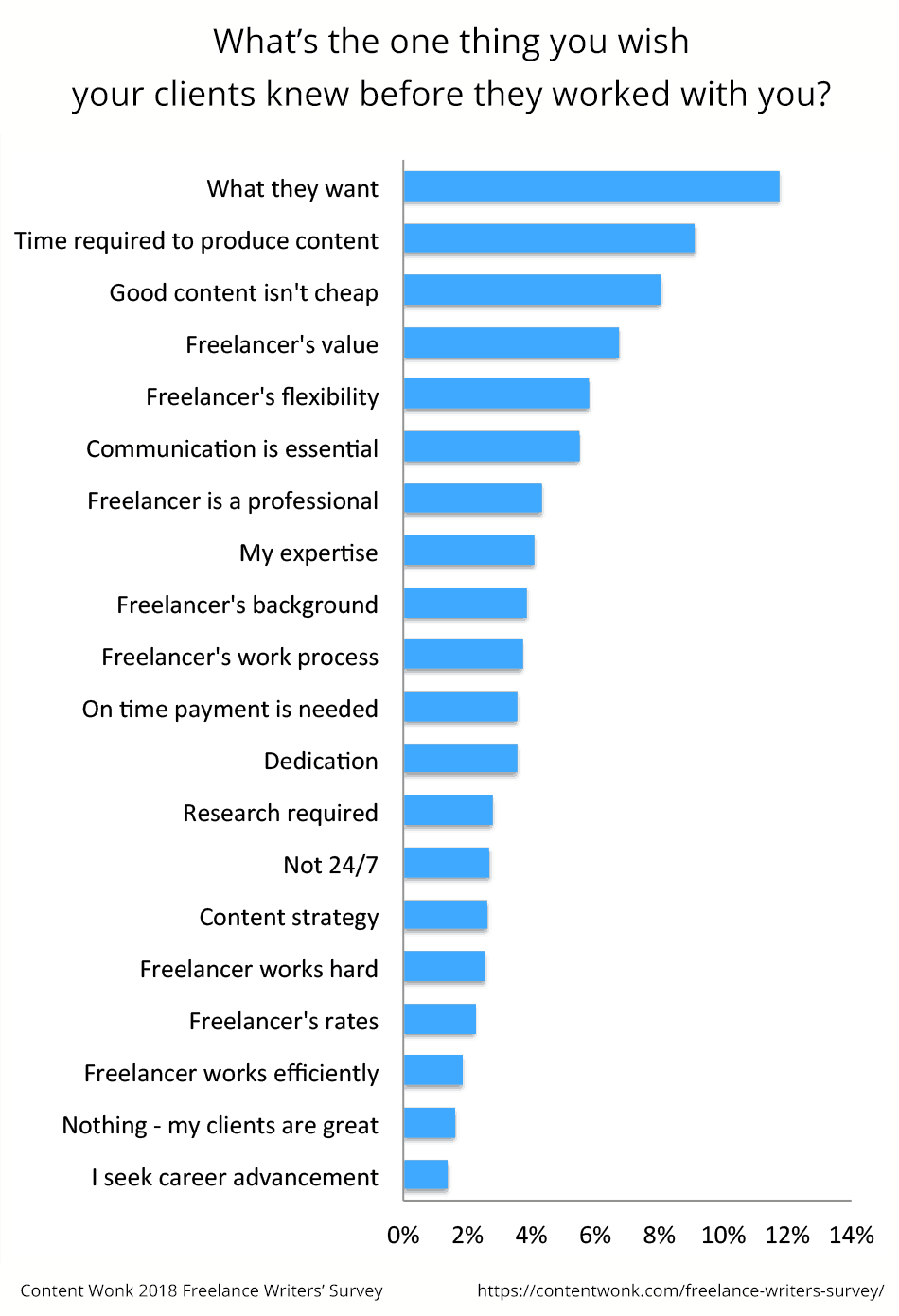
Freelancers also commented a lot about how communication between them and their clients is critically important. Some said generally, “communication is critical”, but many were more detailed, and said things like “feedback is appreciated” and that they have other skills that they wish their clients knew about.
Writing Process
How do freelancer writers work? The answers to this next group of questions will tell us a lot about that.
Let’s start with the most important part of almost any piece of writing: the headline. According to these answers, most freelance writers don’t put a lot of work into their headlines.
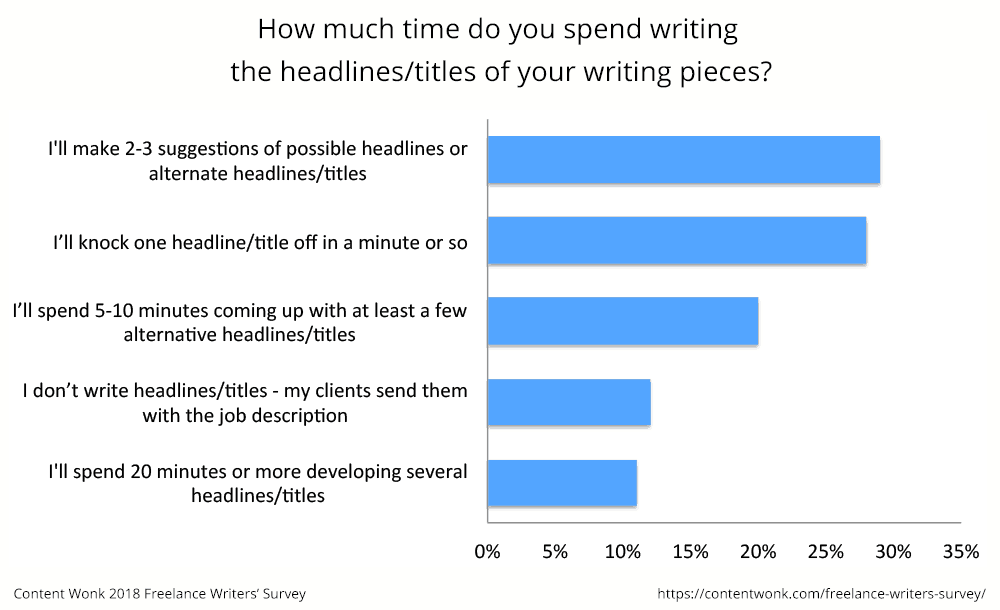
Given how important headlines are to the success of most content formats (articles, blog posts, ebooks, even social media shares), this result is a little disappointing. But the good news is it’s easy to improve here, and freelancers’ work might get more exposure if they put in more time.
If you are among the 11% of freelancers who really puts some work into nailing your headlines, give yourself a pat on the back. Even among high earners, only 16% spend 20 minutes or more crafting their headlines.
How long do you spend proofreading and making final minor edits your work?
This question came from a Content Marketing Manager who was frustrated with the typos she finds in many freelancers’ drafts. And while a typo or two can almost always sneak in, it seems that most freelancers are proofreading their work. Almost half, in fact, spend 20% of their writing time just checking for mistakes.
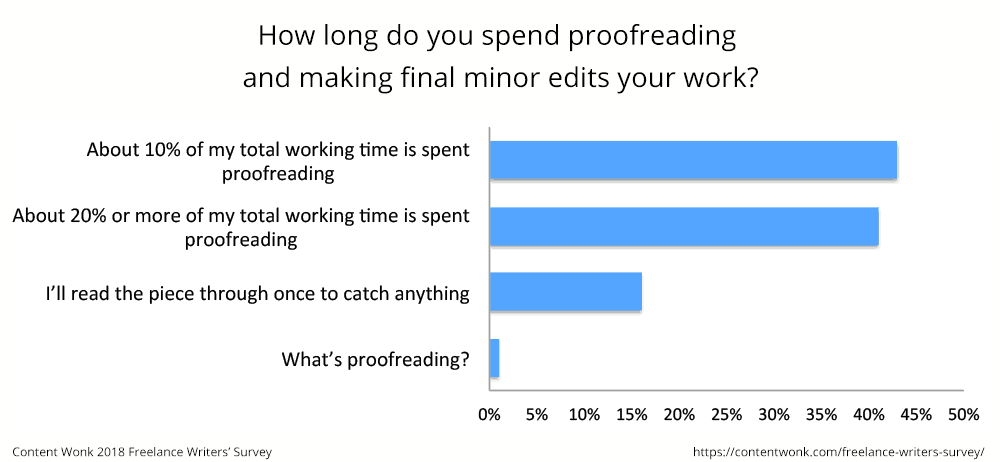
Surprisingly, there was no statistically valid difference between how high and low earners answered this question.
Either freelancers are not very different in how thoroughly they review their work… or they’re fibbing about it.
How often do you get requests for revisions?
Ever wondered if you get more requests for revisions than other writers? This answer should settle that.
Interestingly, higher paid freelancers are more likely than lower earners to say that they get revision requests “a lot” or “often”. This may be because clients justifiably expect more when they’re paying more.
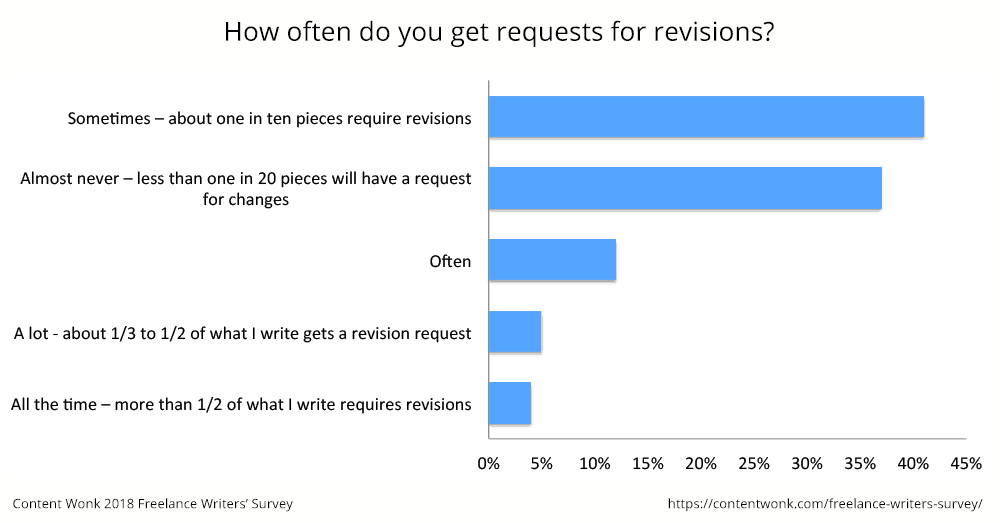
How often do you miss deadlines?
This question revealed something interesting. While many freelancers pride themselves on always making their deadlines (and they should) it doesn’t appear to affect their earnings.
High earning freelancers were just as likely to make or not make their deadline as lower earning freelancers were.
Even for the general population, 65% of freelancers report that they never miss a deadline. 25% say they miss them 10% of the time or less. That means an impressive 90% of freelancers are late less than 10% of the time.
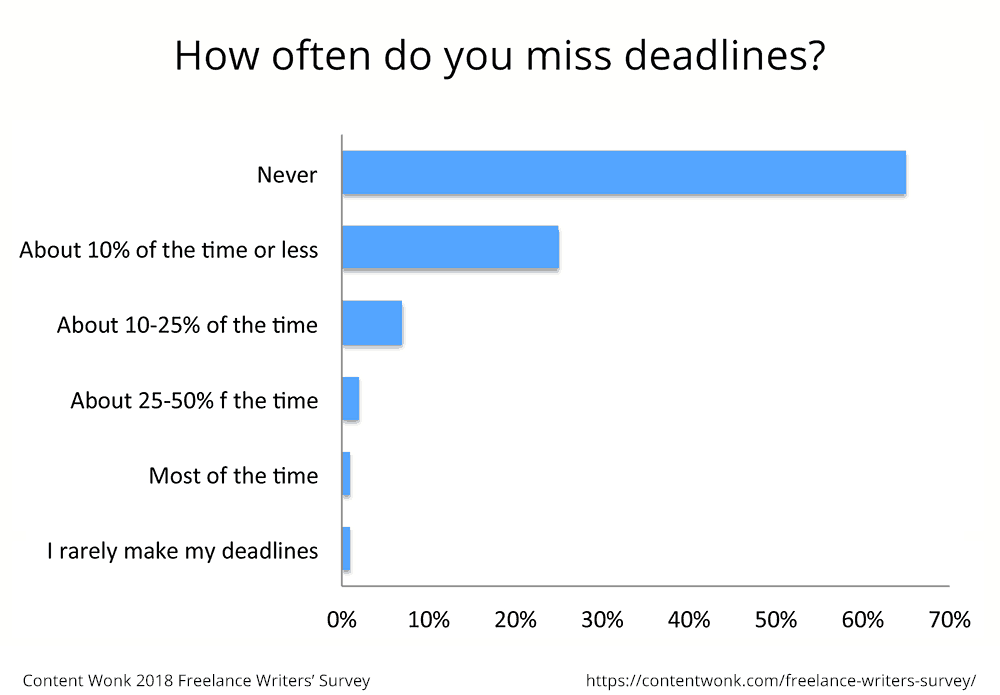
Do you promote the content you create?
If a piece of content’s performance is measured by how often it gets shared, smart freelancers should make a point of sharing and resharing their content.
And they do: 70% of freelance writers promote the content they create. These are the most common ways they do that promotion:
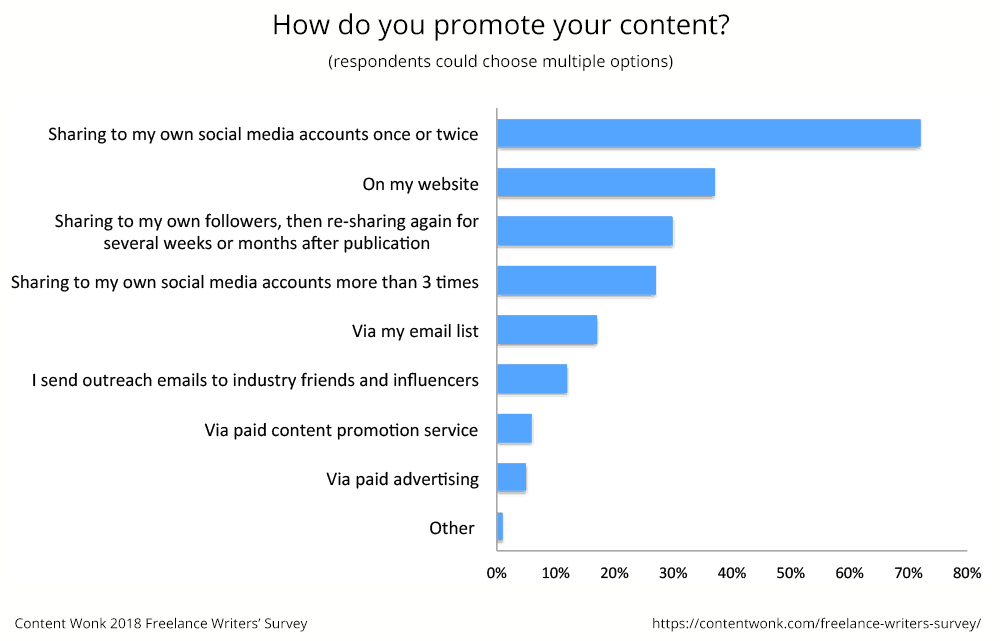
About the future – and some advice
Are you worried about computer-generated writing?
Automation is coming. In fact, it’s already here. Algorithms are already writing news stories and sports stories, financial reports and more.
For right now, these algorithms aren’t too hard to beat. But that’s only true for now. In two years, five years, ten years, they’re going to get a lot better. It’s going to cost some freelance writers their jobs.
That doesn’t necessarily have to mean your job gets cut, but writers would be wise to track this technology and to develop their skills so they can’t be replaced by a bot.
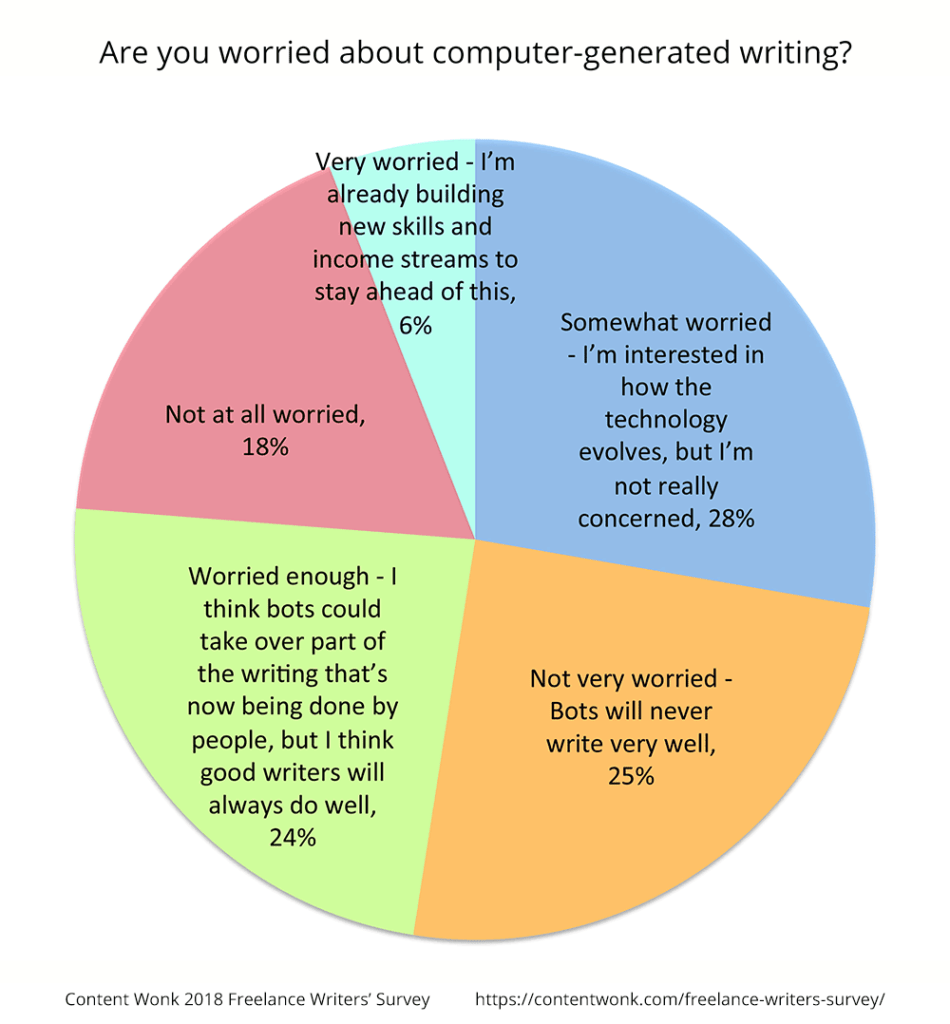
If you could change one thing about your freelance writing, what would it be?
The chart to the right shows the top 20 most common answers for this question. I’ve tried to preserve the actual words and sentiments that freelancers used here, even if some of the categories seem like they mean almost the same thing.
Take “get more work” for example. It’s the last item on the list, and while you could say that’s almost the same thing as “get more clients”, it’s not quite the same thing.
But despite the similar answers, one answer stands out from the rest. Freelance writers keenly wish to be paid better. Given that nearly a third of us are earning less than $15 per hour, that’s not a surprise.
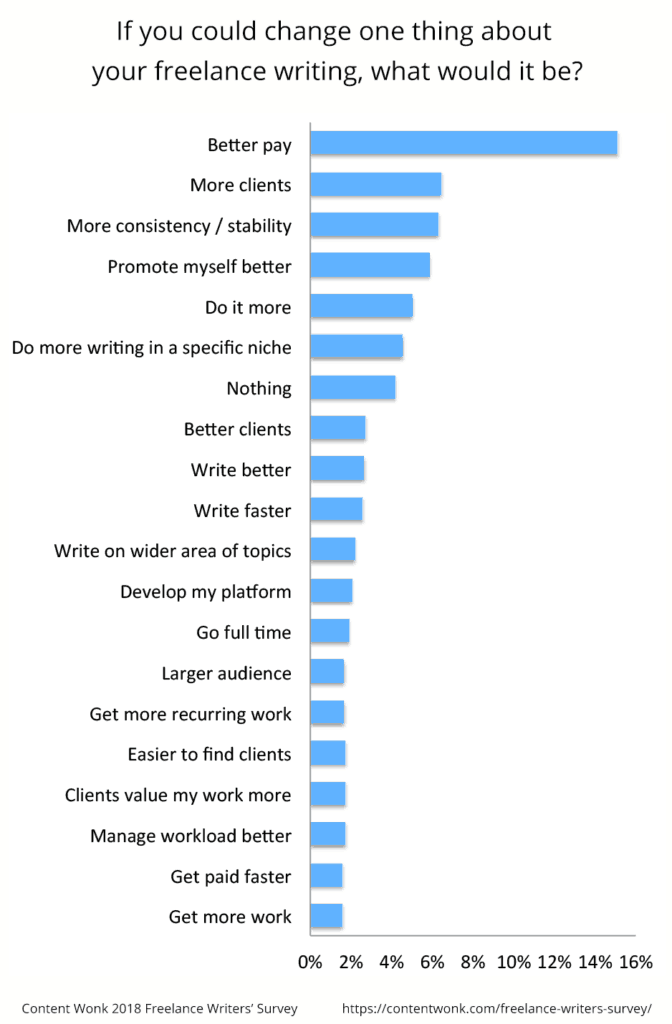
If a good friend asked you about freelance writing as a way to make a living, what would you most likely say?
The answers to this question weren’t all sunshine and roses, but they were at least clear: 62% of respondents said “You can do well, but it’s hard and not for everybody” when asked if they would recommend freelance writing to a friend.
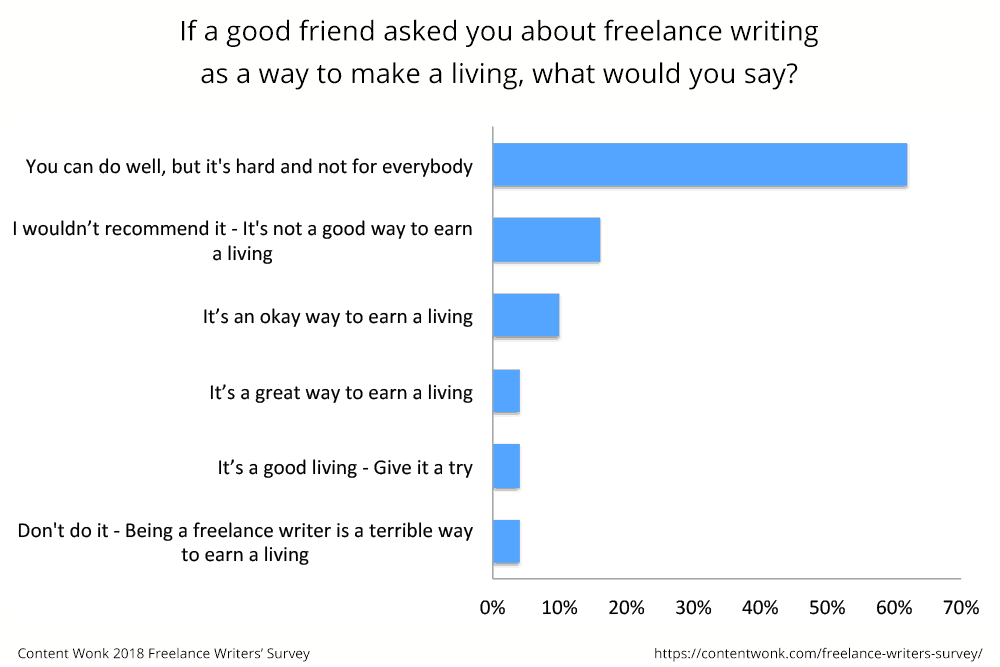
It is disappointing to see so few people say freelance writing is a “good way” or a “great way” to make a living. And 20% of freelancers outright wouldn’t recommend it.
But honesty counts. If you’re considering becoming a freelance writer, you should have a realistic view of what you’re getting into.
The responses concerned me enough that I did a separate analysis of the 259 freelancers who said they wouldn’t recommend this work. Not too surprisingly, people who earn less than $15 per hour are more likely to not recommend freelance writing.
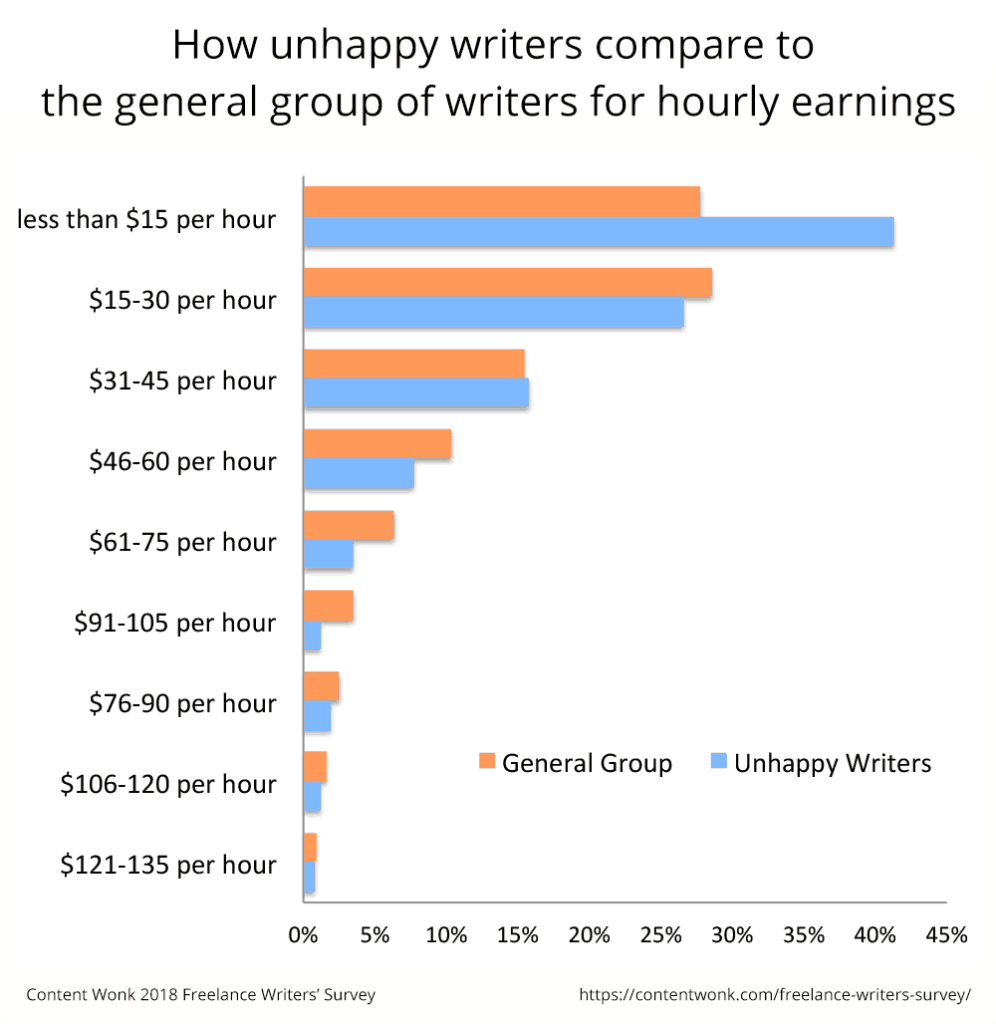
Writers who get paid two months or more after they send their invoices are also more likely to say they wouldn’t recommend freelancing. No wonder.
Methodology
I am so grateful to all the freelancers who contributed to this survey. They were incredibly generous with their time – it took 206 hours of freelancer input to gather the results for this survey. I hope this report will help them earn better incomes and enjoy their work more.
1,308 responses were collected via a Typeform survey over three months. Of the 5,375 visitors to the survey landing page, 24% of the freelancers completed the entire survey. It took them an average of 9:23 minutes to do so.
To collect the responses, we used mostly Twitter advertising (which worked well) and some very limited Facebook advertising, which did not work well.
The advertising was carefully set to show only to freelance writers, and responses were checked and thinned to ensure that only freelance writers were submitting surveys.
We also did outreach to over a thousand writers via their websites. There are several websites/directories that list freelance writers and so we tried to reach every writer on those lists.
We also did outreach to nearly 2,000 freelancers through Twitter direct messages. During the course of the survey I followed about 8,000 freelance writers (based on them identifying themselves as freelance writers in their Twitter bios). Many followed back, and when they did I sent them a direct message to invite them to do the survey.
Any freelance writer who completed the survey was entered to win one of four grand prizes:
• 30 Quuu Promote credits (A $1,500 value – enough to promote 30 articles)
• 20 Quuu Promote credits (A $1,000 value – enough to promote 20 articles)
• A BlogPros Power Blogger campaign for 6 months ($252 value)
• A BlogPros Light Blogger campaign for 6 months ($162 value)
Every freelancer who completed the survey was also entered to win one of twenty $25 Amazon gift certificates. These were offered in three rounds throughout the course of the survey.
About Quuu Promote
It’s a hand-curated promotion service for top-tier content. Approved articles are used to supplement Quuu’s main product, which is basically social media curation done for you.
About BlogPros
It’s a content promotion service that gets automated shares for your content.